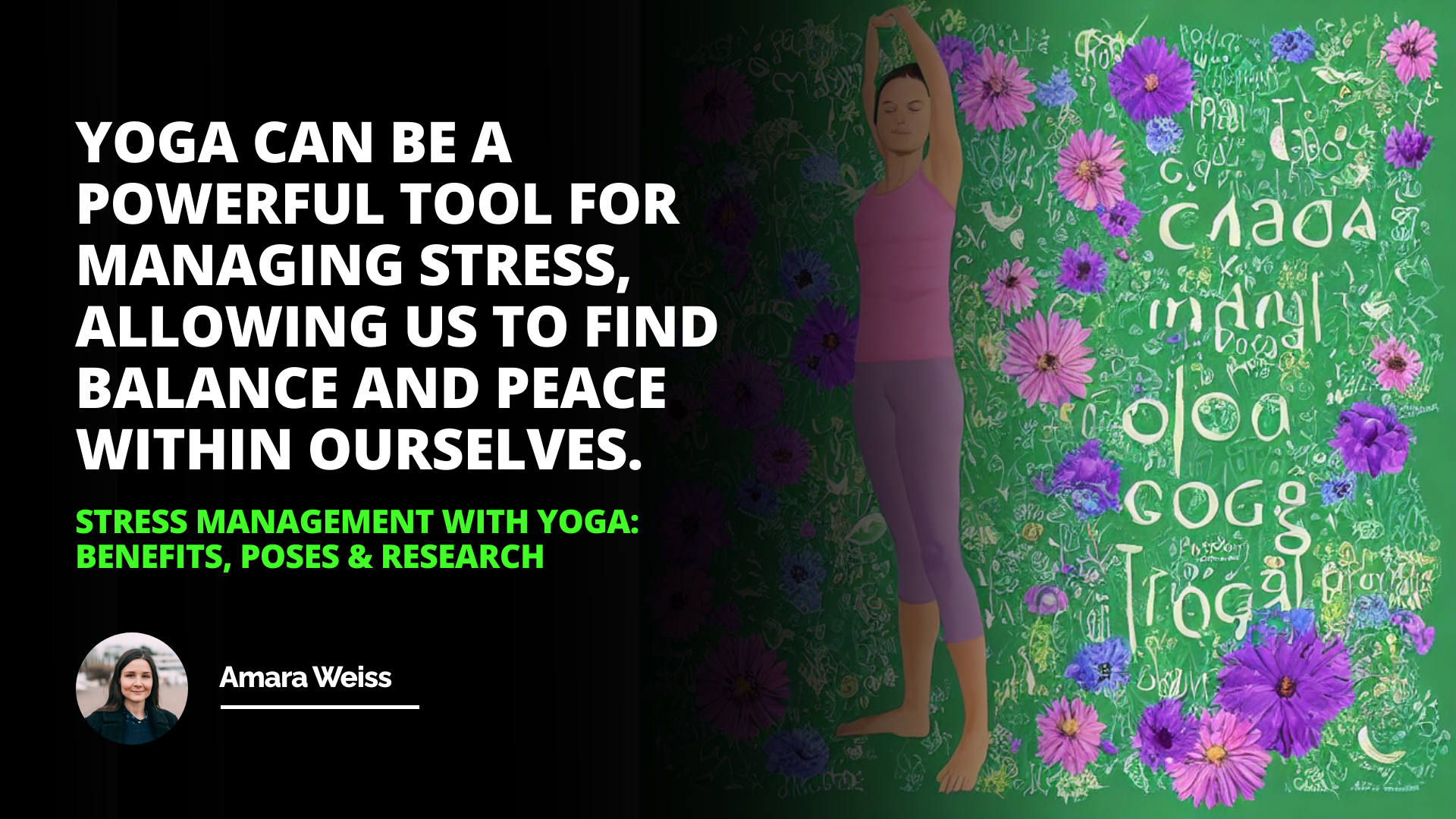
In today's fast-paced and demanding work environment, stress has become a common phenomenon for many professionals. Long working hours, tight deadlines, and high expectations can take a toll on our mental and physical well-being. Therefore, it is crucial to find effective ways to de-stress after work and rejuvenate ourselves. In this article, we will explore various strategies and techniques to help you unwind and relax after a hectic day.
Why is this interview question asked: How Do You De-Stress After Work?
The question "How do you de-stress after work?" is often asked in job interviews to gauge a candidate's ability to manage their stress levels and maintain a healthy work-life balance. Employers are interested in candidates who can handle the pressures of the job without burning out. By asking this question, interviewers can gain valuable insights into a candidate's self-care practices and coping mechanisms.
The purpose of the question
The purpose of asking this question is to assess whether the candidate has a well-rounded approach to self-care and stress management. Employers want to ensure that their potential employees have effective strategies in place to deal with work-related stress and prevent it from spilling over into their personal lives. The question also helps employers understand the candidate's level of self-awareness and commitment to maintaining their well-being.
Related Course: Stress Management Course
At what interview level is it asked?
The question "How do you de-stress after work?" can be asked at various interview levels, from entry-level positions to senior management roles. Stress management is a crucial skill for any job, and employers want to ensure that candidates possess the ability to handle the demands of the role without compromising their mental and physical health.
Strategies For Maintaining Relationships İn Dynamic Supply Chains
How To Answer İnterview Question Describe A Failed Digital Marketing Attempt Effectively
What kind of answer is expected from the candidate?
When answering this question, candidates should provide a balanced and thoughtful response. Employers expect candidates to demonstrate self-awareness and share specific strategies they utilize to unwind after work. The response should showcase the candidate's ability to prioritize self-care and maintain a healthy work-life balance, while still meeting their professional obligations.
Possible answers to consider:
Engaging in physical activity: Many people find that physical exercise helps them de-stress after work. Whether it's going for a run, hitting the gym, or practicing yoga, engaging in physical activity can release endorphins and reduce stress levels. Candidates could mention activities they enjoy and make time for, emphasizing the positive impact it has on their overall well-being.
Pursuing hobbies and interests: Having a creative outlet or engaging in hobbies can provide a much-needed escape from work-related stress. Candidates can discuss activities such as painting, playing a musical instrument, or cooking, showcasing their ability to detach from work and find joy in other areas of their lives.
Spending quality time with loved ones: Building and nurturing meaningful relationships is crucial for maintaining work-life balance. Candidates can highlight the importance of spending time with family and friends, sharing activities they enjoy doing together. This demonstrates their ability to prioritize personal relationships and maintain a support system outside of work.
Practicing mindfulness and relaxation techniques: Mindfulness and relaxation techniques, such as meditation or deep breathing exercises, can help individuals unwind and reduce stress levels. Candidates can showcase their knowledge of these techniques and how they incorporate them into their daily routine to promote relaxation and mental clarity.
Disconnecting from technology: In today's digital age, it's essential to set boundaries and disconnect from work-related technology after hours. Candidates can discuss strategies they use, such as turning off email notifications or designating specific 'tech-free' times, to create a clear separation between work and personal life.
What to consider when answering
When answering the question "How do you de-stress after work?" candidates should consider the following:
Authenticity: It is vital to provide genuine answers based on personal experiences and practices. Interviewers appreciate honesty and sincerity in responses.
Balance: Candidates should emphasize the need for balance between work and personal life. A well-rounded approach to de-stressing after work involves various strategies that cater to different needs and preferences.
Self-Care: Highlight the importance of self-care and its positive impact on job performance. Employers want to hire candidates who prioritize their well-being and can sustainably manage stress levels.
Adaptability: Candidates should highlight their ability to adapt their de-stressing strategies based on different situations and circumstances. This demonstrates flexibility and resilience in managing stress.
The question "How do you de-stress after work?" provides candidates with an opportunity to showcase their ability to manage stress and maintain a healthy work-life balance.
By sharing specific strategies and practices, candidates can demonstrate their commitment to self-care and overall well-being.
Remember to provide authentic and honest answers that reflect personal experiences, and emphasize the importance of balance, self-care, and adaptability in stress management.
De-stress techniques commonly used after work.
Frequency of engaging in de-stress activities after work.
Effectiveness of different de-stress methods after work.
Similar interview questions:
What activities do you engage in to unwind after a long day at work?
In what ways do you alleviate stress once you finish work for the day?
Could you share some effective methods you use to relax after your work hours?
Which strategies do you employ to help relieve stress after a tiring day at the office?
Do you have any go-to techniques that you find helpful for destressing after a demanding day of work?
How do you typically wind down and relax after your workday comes to an end?
What are your preferred ways to unwind and find calmness once you're done with your work obligations?
Are there any specific rituals or practices you follow to de-stress after your work shifts?
Which self-care activities do you prioritize in order to relax and rejuvenate after work?
Can you describe your post-work routine for relieving stress and finding tranquility after a busy day?
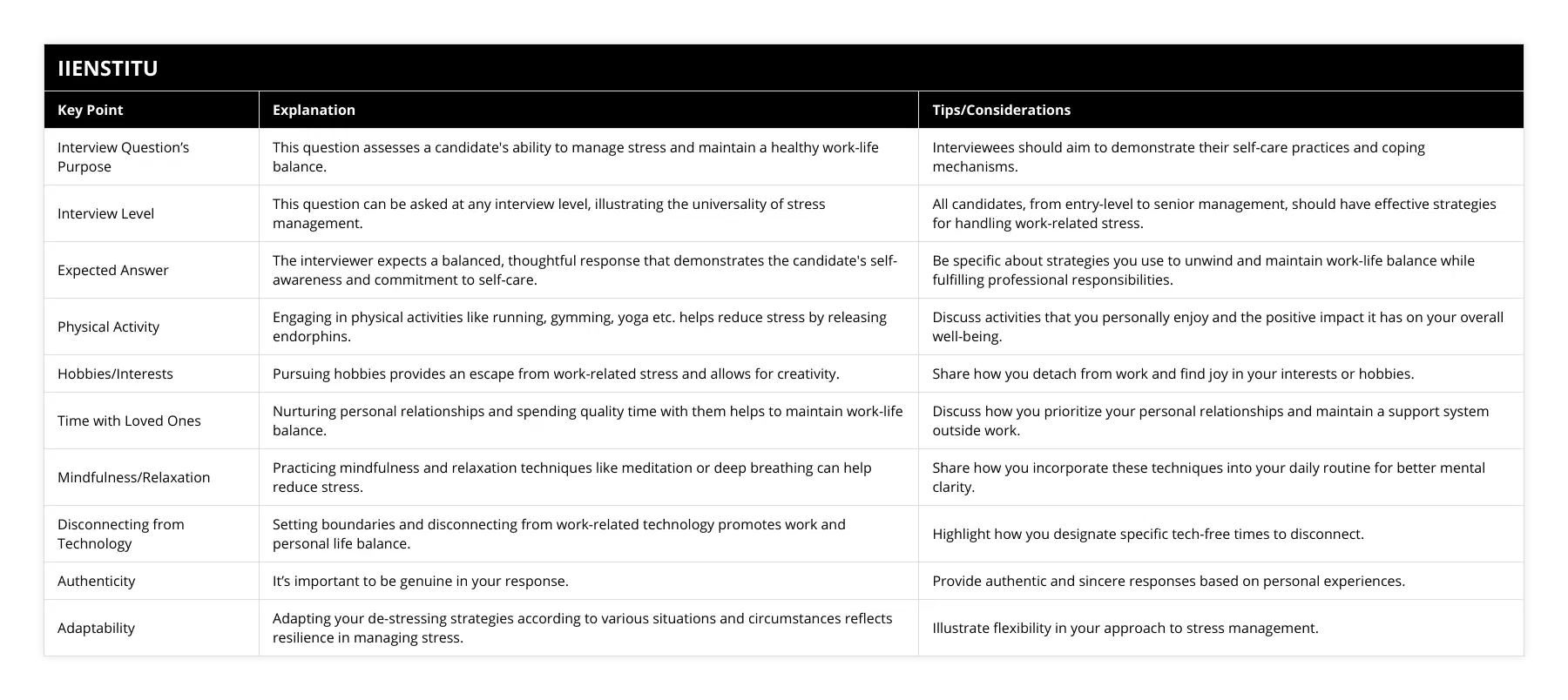
Frequently Asked Questions
How do you typically deal with stressful situations at work?
Dealing with stressful situations at work requires a combination of effective strategies and a positive mindset. Firstly, it is crucial to identify the sources of stress and assess their impact on your well-being and productivity. Once you have a clear understanding of the stressors, you can develop a plan to address them systematically. This may involve prioritizing tasks, breaking them down into manageable chunks, and setting realistic goals and deadlines.
Communication and Support
Open communication with colleagues and supervisors is essential in managing stress at work. Don't hesitate to seek guidance, clarification, or support when needed. Collaborating with team members can help distribute the workload and foster a sense of shared responsibility. Additionally, building a strong support network within and outside the workplace can provide emotional relief and fresh perspectives on challenging situations.
Self-Care and Stress Management Techniques
Engaging in regular self-care activities is vital for maintaining mental and physical well-being during stressful times. This includes taking short breaks throughout the day to recharge, practicing relaxation techniques such as deep breathing or meditation, and engaging in hobbies or physical exercise to release tension. Establishing clear boundaries between work and personal life is also crucial to prevent work-related stress from spilling over into other areas of your life.
Maintaining a Positive Outlook
Cultivating a positive attitude and reframing stressful situations as opportunities for growth and learning can significantly alleviate work-related stress. Focusing on the aspects of your job that you enjoy and find meaningful can help maintain motivation and perspective. Celebrate your accomplishments, no matter how small, and learn from setbacks rather than dwelling on them.
Seeking Professional Help
If work-related stress becomes overwhelming and persistently affects your well-being, it may be beneficial to seek professional help. Many organizations offer employee assistance programs that provide confidential counseling and support services. Talking to a therapist or counselor can help you develop personalized coping strategies and gain a fresh perspective on your challenges.
Remember, managing stress at work is an ongoing process that requires patience, self-awareness, and a proactive approach. By implementing these strategies consistently and prioritizing your well-being, you can effectively navigate stressful situations and maintain a healthy work-life balance.
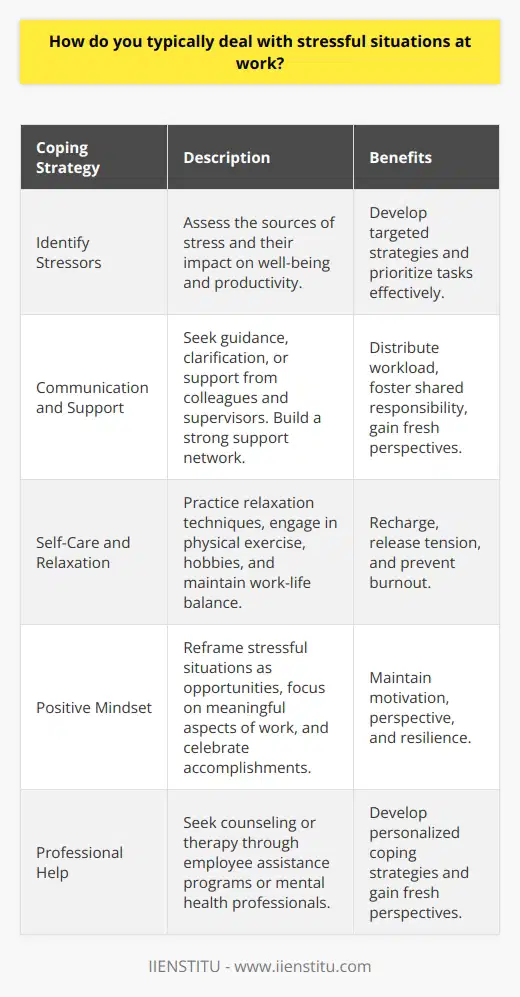
What strategies do you use to manage pressure and maintain productivity?
To manage pressure and maintain productivity, I employ several strategies that help me stay focused and efficient. First, I prioritize my tasks based on urgency and importance, ensuring that I tackle the most critical items first. This approach allows me to allocate my time and energy effectively, reducing the likelihood of becoming overwhelmed by a growing to-do list.
Time Management Techniques
I also utilize various time management techniques, such as the Pomodoro Technique, which involves working in focused 25-minute intervals followed by short breaks. This method helps me maintain concentration and avoid burnout, as it encourages regular rest periods throughout the day. Additionally, I break down larger projects into smaller, manageable tasks, making them less daunting and more achievable.
Stress-Reduction Practices
To further manage pressure, I incorporate stress-reduction practices into my daily routine. I engage in regular physical exercise, such as jogging or yoga, which helps me release tension and maintain a positive mindset. Moreover, I practice mindfulness meditation, taking a few minutes each day to focus on my breath and clear my mind of distracting thoughts.
Effective Communication and Delegation
Effective communication and delegation are also crucial for managing pressure and maintaining productivity. I make sure to communicate clearly with my team members and colleagues, setting realistic expectations and deadlines. When appropriate, I delegate tasks to others, recognizing the value of collaboration and the importance of not overburdening myself with responsibilities that can be shared.
Continuous Learning and Adaptability
Finally, I believe that continuous learning and adaptability are essential for thriving under pressure. I regularly seek out opportunities to expand my knowledge and skills, whether through attending workshops, reading industry publications, or engaging in online courses. By staying informed and embracing new ideas, I am better equipped to handle challenges and maintain productivity in the face of change.
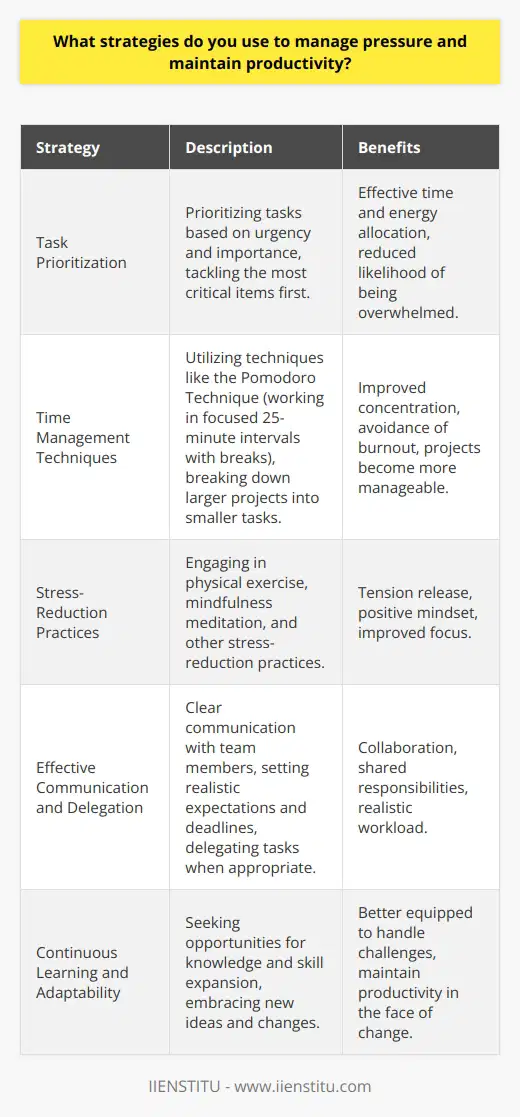
Can you describe a time when you successfully handled a high-pressure situation and delivered results?
One instance where I successfully navigated a high-pressure situation and achieved desired outcomes was during my senior year capstone project. As the team lead, I was responsible for coordinating a group of five students to develop a comprehensive marketing strategy for a local nonprofit organization within a tight two-month timeframe.
Identifying Challenges and Developing a Plan
I recognized the numerous challenges we faced, including limited time, resources, and varying skill levels among team members. To address these issues, I quickly developed a detailed project plan that broke down the larger task into smaller, manageable steps with clear deadlines and responsibilities assigned to each team member.
Effective Communication and Collaboration
I facilitated regular team meetings to ensure everyone was on the same page and making progress. During these meetings, I encouraged open communication, allowing team members to voice concerns, share ideas, and collaborate effectively. I also made myself available for one-on-one discussions to provide guidance and support when needed.
Adaptability and Problem-Solving
Throughout the project, we encountered several unexpected obstacles, such as a team member falling ill and difficulty accessing essential data. I remained calm and focused, quickly adapting our plan and redistributing tasks to ensure we stayed on track. I also reached out to our professor and the nonprofit organization for assistance when necessary, demonstrating resourcefulness and a proactive approach to problem-solving.
Successful Delivery and Results
Despite the challenges, we successfully delivered a comprehensive marketing strategy to the nonprofit organization before the deadline. Our plan included a detailed analysis of their target audience, a revamped social media presence, and a series of cost-effective promotional events. The organization was extremely satisfied with our work and implemented several of our recommendations, resulting in increased community engagement and donations.
Lessons Learned and Personal Growth
This experience taught me the importance of effective planning, communication, and adaptability when working under pressure. I learned to break down complex tasks, delegate responsibilities, and leverage the strengths of each team member. Additionally, I discovered the value of remaining calm and focused in the face of adversity, as well as the importance of seeking help when needed.
In conclusion, successfully handling this high-pressure situation not only allowed me to deliver excellent results but also contributed to my personal and professional growth. It reinforced my ability to lead, communicate, and problem-solve effectively, skills that I continue to apply in my current role and future endeavors.
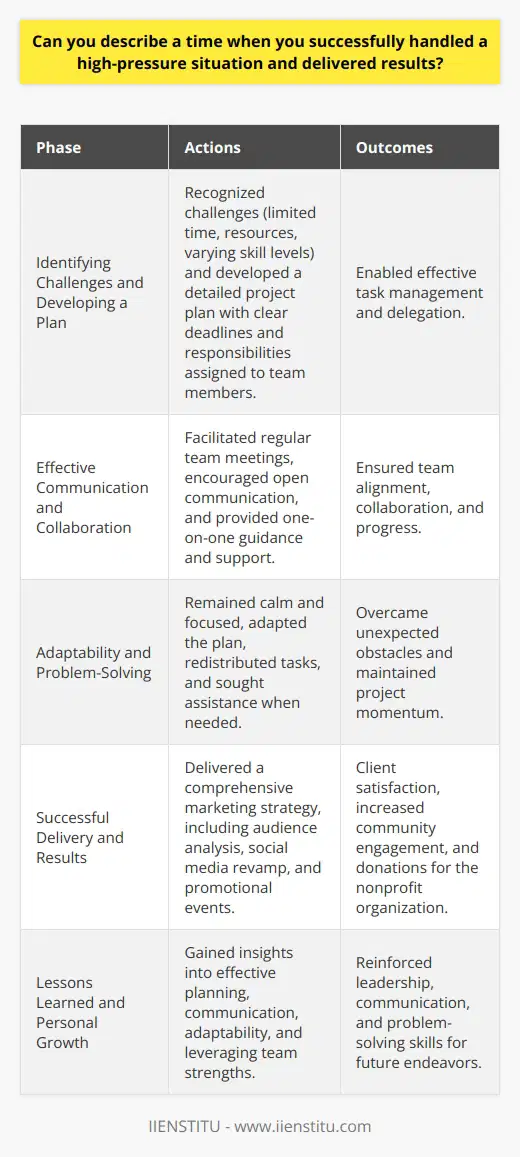
How do you handle stressful situations at work?
Handling stressful situations at work requires a combination of effective strategies and a positive mindset. First, it's essential to identify the sources of stress in your workplace. These may include tight deadlines, heavy workloads, conflicts with coworkers, or a lack of resources. Once you've pinpointed the stressors, you can develop a plan to address them.
Prioritize and Organize
One key strategy for managing stress is to prioritize your tasks and organize your workload. Break down large projects into smaller, manageable steps. Create a to-do list and tackle the most critical or time-sensitive tasks first. By focusing on one task at a time, you can reduce feelings of being overwhelmed.
Communicate Effectively
Effective communication is crucial in stressful situations. If you're feeling overburdened, don't hesitate to speak with your supervisor or colleagues. Explain your concerns and ask for support or guidance. Clear and open communication can help alleviate misunderstandings and foster a more collaborative work environment.
Practice Time Management
Good time management skills can significantly reduce stress levels. Use tools like calendars, productivity apps, or time-blocking techniques to structure your day. Set realistic goals and deadlines for yourself, and allow for some flexibility in your schedule. Remember to take regular breaks to recharge and avoid burnout.
Develop Coping Mechanisms
Find healthy ways to cope with stress. This may include deep breathing exercises, meditation, or engaging in physical activity. Taking short breaks throughout the day to stretch, walk, or practice mindfulness can help you maintain a sense of calm and focus.
Maintain Work-Life Balance
Strive to maintain a healthy work-life balance. Set boundaries between your professional and personal life. Avoid constantly checking work emails or taking work home with you. Engage in hobbies, spend time with loved ones, and prioritize self-care activities to reduce overall stress levels.
Seek Support
Don't hesitate to seek support when needed. Reach out to trusted colleagues, friends, or family members for advice or a listening ear. If stress becomes overwhelming, consider seeking professional help from a therapist or counselor who can provide additional coping strategies.
Embrace a Positive Outlook
Finally, try to maintain a positive outlook. Reframe challenges as opportunities for growth and learning. Celebrate your accomplishments, no matter how small. Cultivate a growth mindset and view setbacks as temporary hurdles rather than permanent failures.
By implementing these strategies and maintaining a proactive approach, you can effectively handle stressful situations at work. Remember, stress is a natural part of any job, but with the right tools and mindset, you can navigate these challenges with greater ease and resilience.
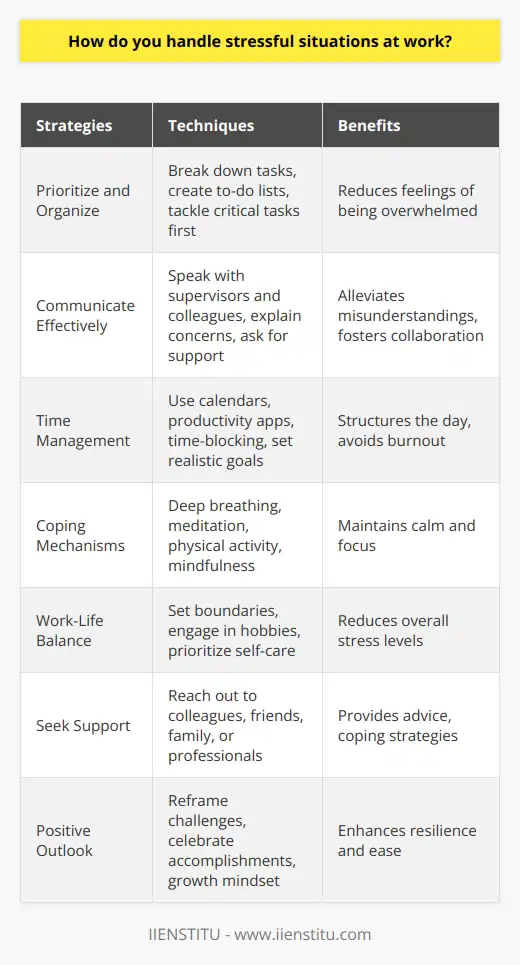
How do you cope with stress when deadlines are looming?
Coping with stress when deadlines are looming is a common challenge faced by many individuals. Effective stress management strategies can help maintain productivity and well-being during these high-pressure situations. One approach is to prioritize tasks based on their urgency and importance, ensuring that the most critical items are addressed first. Breaking larger projects into smaller, manageable steps can also make the workload feel less overwhelming. Additionally, practicing time management techniques, such as the Pomodoro Technique, can help maintain focus and prevent burnout.
The Importance of Self-Care
During stressful periods, it is crucial to prioritize self-care to maintain physical and mental well-being. Engaging in regular exercise, even short breaks for stretching or walking, can help reduce stress and improve overall mood. Maintaining a balanced diet and staying hydrated can also contribute to better stress management. Adequate sleep is essential for cognitive function and emotional regulation, so it is important to establish a consistent sleep schedule and create a relaxing bedtime routine. Incorporating stress-reducing activities, such as meditation, deep breathing exercises, or hobbies, can provide much-needed breaks and help restore a sense of calm.
Communication and Support
Open communication with colleagues, supervisors, or team members can help alleviate stress when deadlines are approaching. Discussing concerns, seeking clarification on expectations, and requesting assistance when needed can help distribute the workload and foster a supportive work environment. Building a strong support network of friends, family, or professionals can provide a valuable outlet for discussing stressors and receiving encouragement. Engaging in social activities or hobbies outside of work can also serve as a healthy distraction and help maintain a sense of balance.
Realistic Expectations and Adaptability
Setting realistic expectations for oneself and others is essential when managing stress related to deadlines. Recognizing that perfection may not always be achievable within time constraints can help alleviate self-imposed pressure. Being adaptable and willing to adjust strategies or timelines when necessary can also reduce stress. Regularly assessing progress and making adjustments to plans can help ensure that goals are met while minimizing stress. Celebrating small victories and acknowledging progress can provide motivation and a sense of accomplishment, even when deadlines are still looming.
Professional Help and Resources
When stress becomes overwhelming or begins to impact daily functioning, seeking professional help can be beneficial. Mental health professionals, such as therapists or counselors, can provide personalized strategies for managing stress and developing coping mechanisms. Many workplaces also offer employee assistance programs (EAPs) that provide confidential counseling and support services. Utilizing available resources, such as stress management workshops, time management tools, or online support communities, can also provide valuable insights and strategies for coping with deadline-related stress.
Conclusion
Coping with stress when deadlines are looming requires a multifaceted approach that addresses both practical strategies and personal well-being. By prioritizing tasks, practicing effective time management, engaging in self-care activities, and seeking support when needed, individuals can effectively manage stress and maintain productivity during high-pressure periods. Developing a personalized stress management plan and being proactive in addressing stressors can help build resilience and foster long-term success in the face of challenging deadlines.
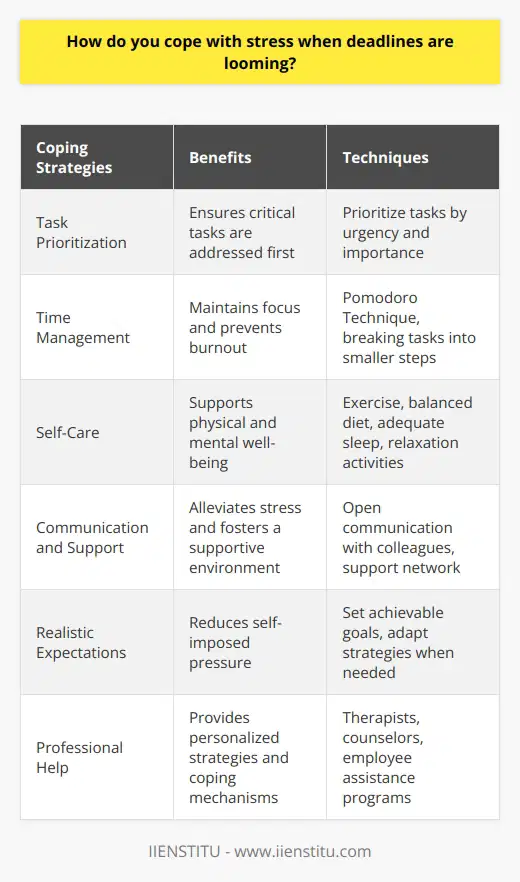
What strategies do you employ to manage stress in high-pressure environments?
Managing stress in high-pressure environments requires a combination of personal strategies and organizational support. One effective approach is to prioritize tasks and focus on the most critical ones first. This helps to reduce feelings of overwhelm and ensures that important work gets done. Another key strategy is to take regular breaks throughout the day to recharge and refocus. Even short breaks of a few minutes can help to reduce stress levels and improve productivity.
Effective Communication and Collaboration
Effective communication and collaboration with team members can also help to manage stress in high-pressure environments. Clear communication ensures that everyone is on the same page and reduces the likelihood of misunderstandings or conflicts. Collaborating with colleagues can also help to distribute workload and provide support during challenging times. Building strong relationships with coworkers can create a sense of camaraderie and reduce feelings of isolation.
Mindfulness and Relaxation Techniques
Incorporating mindfulness and relaxation techniques into daily routines can be highly beneficial for managing stress. Practices such as deep breathing, meditation, or yoga can help to calm the mind and reduce physical tension. Taking a few minutes each day to engage in these activities can have a cumulative effect on reducing stress levels over time. Additionally, regular exercise and maintaining a healthy diet can improve overall well-being and resilience to stress.
Setting Boundaries and Realistic Expectations
Setting boundaries and realistic expectations is crucial for managing stress in high-pressure environments. It's important to communicate limits and capabilities clearly to avoid taking on more than can be handled. Learning to say no when necessary and delegating tasks when appropriate can help to reduce workload and prevent burnout. It's also essential to set realistic goals and expectations for oneself and others to avoid unnecessary pressure and disappointment.
Seeking Support and Resources
Finally, seeking support and resources when needed is a key strategy for managing stress. This may involve reaching out to a supervisor or HR representative to discuss concerns and explore solutions. Many organizations also offer employee assistance programs or stress management workshops that can provide valuable tools and techniques. Seeking support from friends, family, or a professional counselor can also be helpful in managing stress and maintaining overall well-being.
In summary, managing stress in high-pressure environments requires a proactive and multifaceted approach. By prioritizing tasks, taking breaks, communicating effectively, practicing mindfulness, setting boundaries, and seeking support when needed, individuals can develop resilience and thrive in challenging work environments.
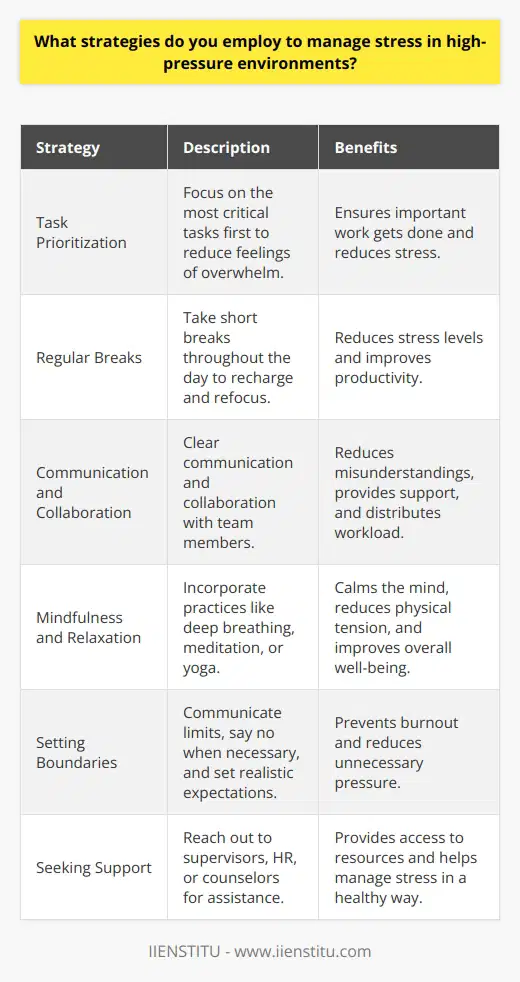
How do you manage stress and pressure in your professional life?
Managing stress and pressure in your professional life is crucial for maintaining well-being and optimal performance. Implementing effective strategies can help you navigate challenging situations and prevent burnout. This article explores various techniques to manage stress and pressure in the workplace.
Prioritize and Organize Tasks
One of the most effective ways to manage stress is to prioritize and organize your tasks. Create a to-do list and rank tasks based on their importance and urgency. Break larger projects into smaller, manageable steps. This approach helps you focus on the most critical tasks and avoid feeling overwhelmed.
Use Time Management Techniques
Employ time management techniques such as the Pomodoro Technique or time blocking. These methods involve dedicating specific intervals to focused work, followed by short breaks. They help you maintain concentration and avoid procrastination, reducing stress and increasing productivity.
Practice Mindfulness and Relaxation
Incorporating mindfulness and relaxation practices into your daily routine can significantly reduce stress. Engage in activities such as deep breathing exercises, meditation, or yoga. These practices promote calmness, clarity, and emotional balance, enabling you to approach challenges with a more relaxed and focused mindset.
Take Regular Breaks
Taking regular breaks throughout the workday is essential for managing stress. Step away from your desk, stretch, or take a short walk. Engaging in brief periods of physical activity and mental disengagement helps refresh your mind and reduces the buildup of stress and pressure.
Establish Boundaries and Communicate Effectively
Setting clear boundaries and communicating effectively with colleagues and superiors can alleviate stress. Learn to say no to unreasonable requests or tasks that exceed your capacity. Communicate your workload and constraints openly and honestly. Engaging in open and constructive dialogue fosters understanding and support within the workplace.
Seek Support and Delegate
Don't hesitate to seek support from colleagues, supervisors, or mentors when facing challenging situations. Collaborate with team members and delegate tasks when appropriate. Sharing responsibilities and seeking guidance can lighten your workload and provide valuable insights and solutions.
Maintain Work-Life Balance
Achieving a healthy work-life balance is crucial for managing stress and pressure. Set clear boundaries between your professional and personal life. Dedicate time for hobbies, relaxation, and socializing outside of work. Engaging in activities that bring you joy and fulfillment helps recharge your batteries and maintains a sense of perspective.
Practice Self-Care
Prioritize self-care to manage stress effectively. Ensure you get enough sleep, eat a balanced diet, and engage in regular exercise. Taking care of your physical and mental well-being enhances your resilience and ability to cope with pressure.
By implementing these strategies, you can effectively manage stress and pressure in your professional life. Remember, it's a continuous process that requires self-awareness, commitment, and adaptability. Prioritize your well-being, seek support when needed, and maintain a balanced approach to work and life. By doing so, you can thrive in your career while maintaining a healthy and fulfilling lifestyle.
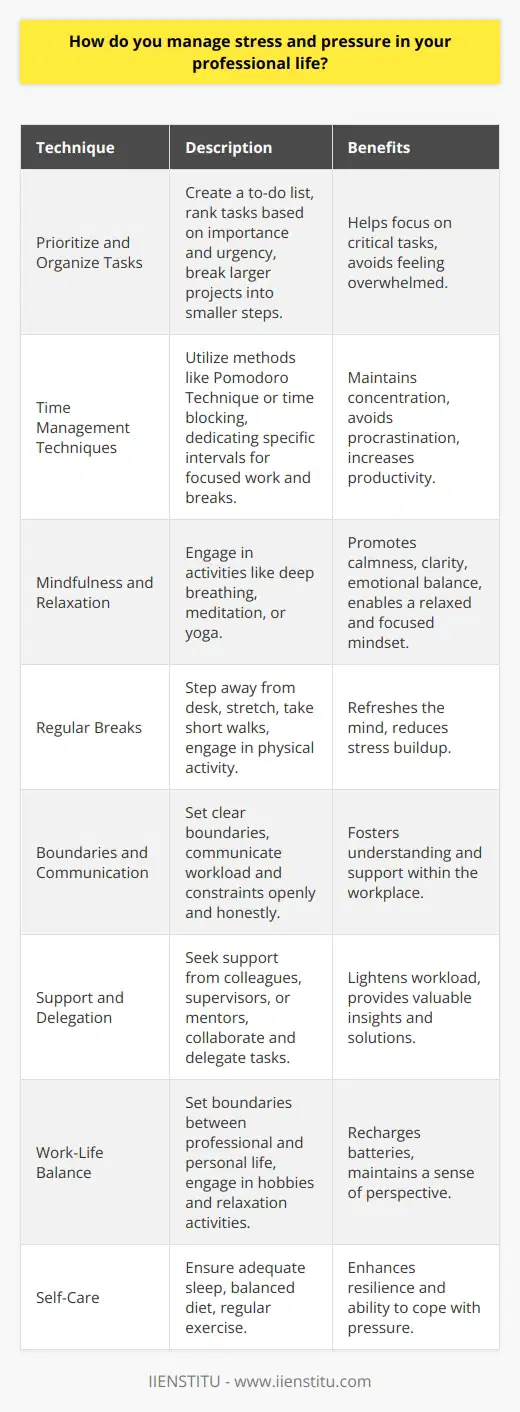
What strategies do you employ to cope with job-related stress?
Coping with job-related stress is crucial for maintaining mental well-being and optimal performance in the workplace. Several strategies can be employed to effectively manage and alleviate the stress associated with one's profession.
Prioritizing Self-Care
One of the most important strategies for coping with job-related stress is prioritizing self-care. This involves setting aside time for activities that promote physical, mental, and emotional well-being. Regular exercise, such as yoga or cardiovascular workouts, can help reduce stress levels and improve overall mood. Engaging in hobbies and leisure activities, like reading or painting, allows for mental relaxation and a break from work-related thoughts.
Maintaining a Healthy Work-Life Balance
Establishing and maintaining a healthy work-life balance is another key strategy for managing job-related stress. Setting clear boundaries between work and personal life helps prevent work-related issues from spilling over into one's personal space. This can be achieved by adhering to a strict work schedule, avoiding work-related tasks during off-hours, and dedicating time to family, friends, and personal interests.
Developing Effective Time Management Skills
Effective time management skills are essential for coping with job-related stress. Prioritizing tasks, setting realistic deadlines, and breaking larger projects into smaller, manageable steps can help alleviate the overwhelming feeling often associated with work responsibilities. Utilizing tools like calendars, to-do lists, and productivity apps can aid in organizing and streamlining one's workload, reducing stress levels in the process.
Cultivating a Support System
Cultivating a strong support system, both within and outside the workplace, is crucial for managing job-related stress. Building positive relationships with colleagues and supervisors can create a more supportive and collaborative work environment. Seeking guidance and support from mentors or trusted colleagues can provide valuable insights and help navigate challenging situations. Outside of work, having a network of friends and family members to confide in and seek encouragement from can offer a much-needed outlet for stress relief.
Practicing Mindfulness and Relaxation Techniques
Incorporating mindfulness and relaxation techniques into one's daily routine can be highly effective in managing job-related stress. Mindfulness practices, such as meditation or deep breathing exercises, help focus the mind on the present moment and reduce anxiety. Progressive muscle relaxation, guided imagery, and other relaxation techniques can promote a sense of calm and reduce physical tension associated with stress.
Seeking Professional Help
When job-related stress becomes overwhelming or persistent, seeking professional help is a proactive and responsible strategy. Many organizations offer employee assistance programs (EAPs) that provide confidential counseling services for work-related issues. Talking to a therapist or counselor can help individuals develop personalized coping strategies, gain new perspectives, and work through the underlying causes of their stress.
By employing a combination of these strategies, individuals can effectively cope with job-related stress and maintain a healthy, productive, and fulfilling professional life.
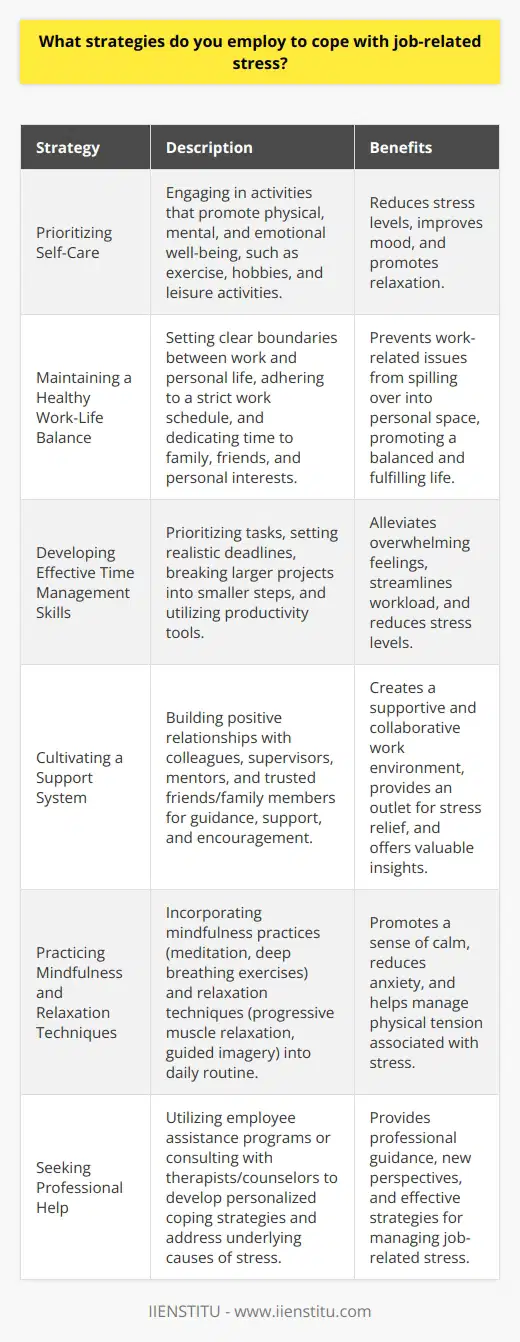
In what ways do you handle the demands and pressures associated with your work?
Handling the demands and pressures associated with work requires a multifaceted approach that encompasses various strategies and techniques. One effective way to manage work-related stress is through proper time management and prioritization. By creating a structured schedule and allocating sufficient time for each task, individuals can ensure that they meet deadlines and avoid last-minute rushes. Additionally, breaking down larger projects into smaller, manageable chunks can help alleviate the feeling of being overwhelmed and enable a more focused and productive work environment.
Effective Communication and Delegation
Another crucial aspect of managing work-related pressures is effective communication and delegation. Engaging in open and transparent communication with colleagues and supervisors can help clarify expectations, resolve conflicts, and foster a supportive work environment. Moreover, delegating tasks to capable team members not only reduces individual workload but also promotes collaboration and trust within the team. By sharing responsibilities and leveraging the skills and expertise of others, individuals can mitigate the burden of excessive workload and maintain a healthier work-life balance.
Stress Management Techniques
Incorporating stress management techniques into daily routines is essential for coping with work-related pressures. Regular exercise, such as walking or yoga, can help reduce stress levels and improve overall well-being. Engaging in relaxation practices, like deep breathing exercises or meditation, can also promote mental clarity and emotional stability. Additionally, maintaining a healthy diet, staying hydrated, and getting sufficient sleep are crucial for managing stress and enhancing cognitive function.
Setting Boundaries and Practicing Self-Care
Establishing clear boundaries between work and personal life is vital for managing work-related demands. Setting realistic expectations, learning to say no when necessary, and prioritizing self-care activities can prevent burnout and maintain a sense of balance. Taking regular breaks throughout the workday, engaging in hobbies or leisure activities outside of work, and nurturing supportive relationships can provide a much-needed respite from work-related pressures.
Continuous Learning and Adaptability
Embracing continuous learning and adaptability is key to navigating the ever-changing demands of the workplace. Staying updated with industry trends, acquiring new skills, and seeking opportunities for professional development can enhance resilience and confidence in the face of work-related challenges. By cultivating a growth mindset and embracing change as an opportunity for learning and improvement, individuals can better handle the pressures associated with their work.
In conclusion, managing the demands and pressures of work requires a proactive and holistic approach. By implementing effective time management strategies, fostering open communication, delegating tasks, and prioritizing self-care, individuals can cultivate resilience and maintain a healthy work-life balance. Embracing continuous learning and adaptability further empowers individuals to navigate the complexities of the modern workplace and thrive in the face of work-related pressures.
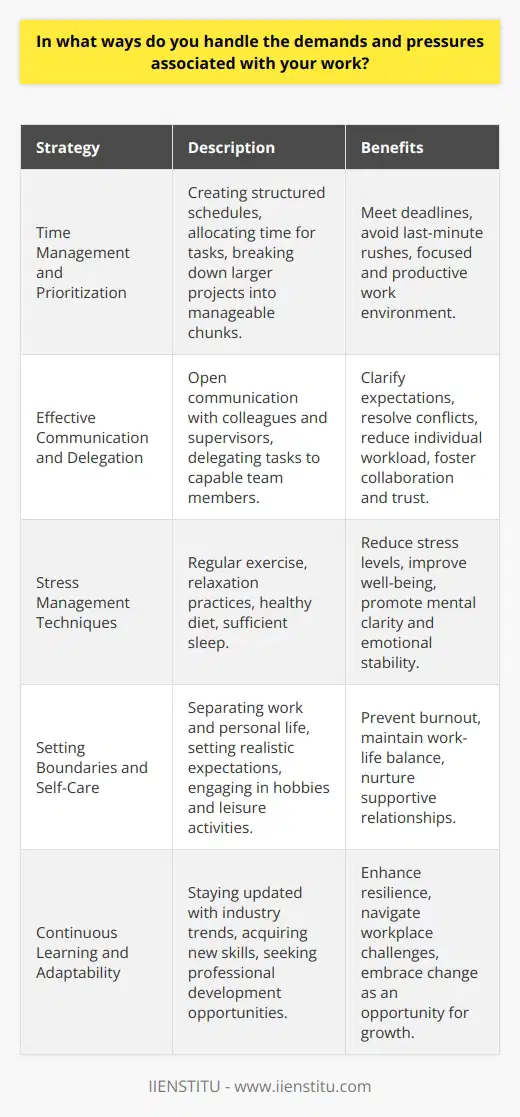
What are some common sample stress interview questions and how should they be answered?
Stress interviews are designed to test a candidate's ability to handle pressure and think on their feet. Interviewers may ask challenging or unexpected questions to observe how the candidate responds. Some common stress interview questions include:
1. "How would you handle a situation where you made a mistake that cost the company money?"
When answering this question, acknowledge the mistake and take responsibility for it. Explain the steps you would take to rectify the situation and prevent it from happening again. Emphasize your ability to learn from mistakes and your commitment to finding solutions.
2. "Tell me about a time when you had to work with a difficult colleague."
Describe a specific situation where you encountered a challenging coworker. Focus on how you maintained professionalism and found ways to collaborate effectively. Highlight your communication skills, empathy, and ability to find common ground.
3. "How do you handle tight deadlines and multiple competing priorities?"
Discuss your strategy for managing time and prioritizing tasks. Explain how you break down large projects into smaller, manageable steps. Provide examples of how you have successfully met deadlines in the past while maintaining quality.
Tips for answering stress interview questions:
Stay calm and composed, even if the questions seem confrontational.
Take a moment to collect your thoughts before responding.
Use specific examples from your experience to illustrate your points.
Focus on the positive outcomes and lessons learned from challenging situations.
Demonstrate your problem-solving skills and ability to work under pressure.
Remember, the interviewer is not trying to trick you or make you fail.
They want to see how you handle stress and think critically. By preparing for these types of questions and remaining confident in your abilities, you can showcase your resilience and adaptability as a candidate.
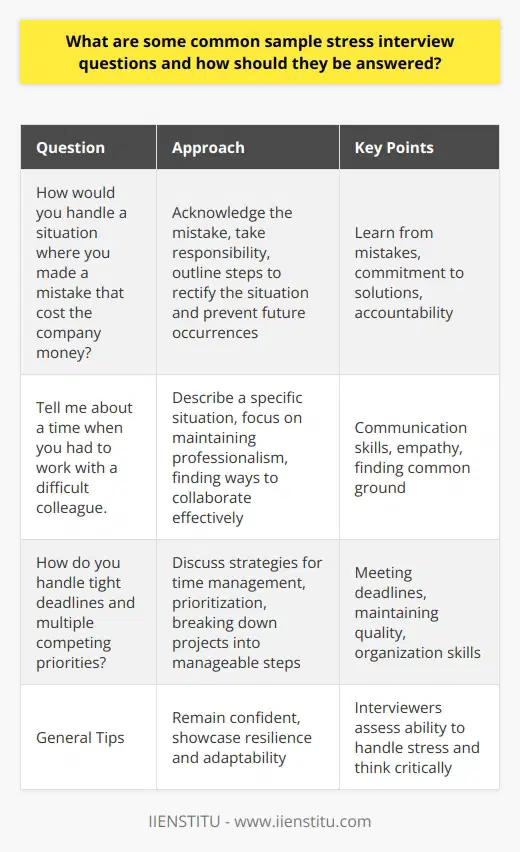
How can a candidate prepare for sample stress interview questions to increase their chances of success?
Preparing for sample stress interview questions is crucial for candidates to increase their chances of success during the hiring process. To effectively tackle these challenging questions, candidates should first research common stress interview questions and familiarize themselves with the types of queries they may encounter. This preparation allows them to anticipate potential questions and formulate thoughtful, composed responses ahead of time.
Practice Remaining Calm Under Pressure
Candidates should practice remaining calm and collected when faced with stress interview questions. Taking deep breaths, maintaining a steady voice, and exhibiting confident body language can help candidates demonstrate their ability to handle pressure. Engaging in mock interviews with friends, family, or career coaches can provide valuable opportunities to practice these techniques in a simulated environment.
Focus on Problem-Solving Skills
Stress interview questions often focus on assessing a candidate's problem-solving abilities. Candidates should prepare examples from their past experiences that showcase their skills in analyzing complex situations, thinking critically, and developing effective solutions. By having specific instances ready to discuss, candidates can provide concrete evidence of their problem-solving capabilities during the interview.
Highlight Adaptability and Resilience
Interviewers use stress questions to gauge a candidate's adaptability and resilience. Candidates should reflect on times when they successfully navigated change, overcame obstacles, or learned from failures. Preparing anecdotes that illustrate their flexibility, willingness to learn, and ability to bounce back from setbacks can help candidates demonstrate their adaptability and resilience to potential employers.
Maintain a Positive Attitude
Throughout the stress interview, candidates should strive to maintain a positive and professional demeanor. Avoiding defensiveness, expressing enthusiasm for the opportunity, and showing a genuine interest in the company can help candidates make a favorable impression. Candidates should view stress questions as an opportunity to showcase their strengths and emphasize their fit for the role.
Prepare for Unconventional Questions
Some stress interviews may include unconventional or seemingly irrelevant questions. Candidates should be prepared to think on their feet and provide thoughtful, creative responses. Practicing brainstorming techniques and engaging in lateral thinking exercises can help candidates develop the mental agility needed to tackle unexpected questions with confidence.
Seek Feedback and Reflect
After practicing stress interview questions, candidates should seek feedback from mock interviewers or mentors. This feedback can help identify areas for improvement and refine their responses. Candidates should also take time to reflect on their performance, considering what worked well and what they can improve upon in future interviews.
By thoroughly preparing for sample stress interview questions, practicing techniques to remain calm under pressure, and showcasing their problem-solving skills, adaptability, and positive attitude, candidates can significantly increase their chances of success in the hiring process. With dedication and practice, candidates can confidently navigate even the most challenging stress interviews and demonstrate their potential as valuable additions to any organization.
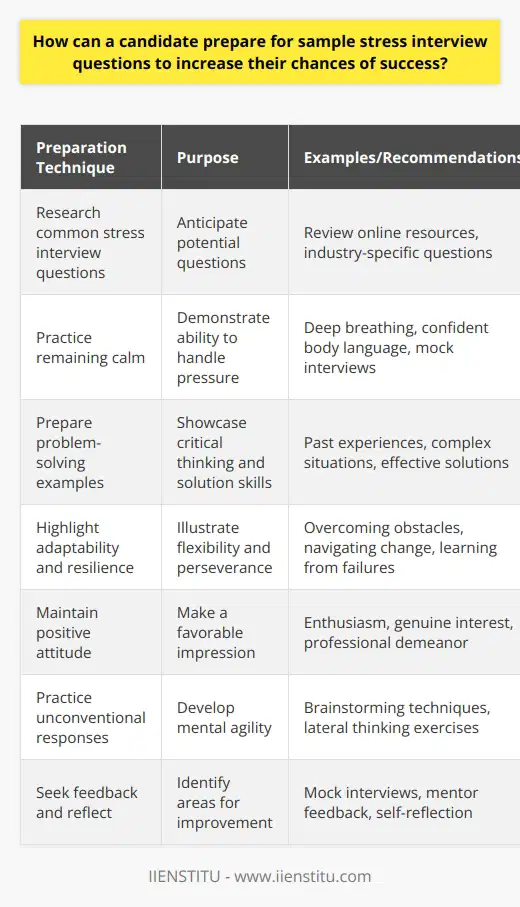
What are the most effective strategies for responding to sample stress interview questions during a job interview?
Responding effectively to sample stress interview questions during a job interview requires a combination of preparation, self-awareness, and composure. To successfully navigate these challenging questions, candidates should first anticipate potential stress-inducing scenarios and practice their responses beforehand. This preparation allows for greater confidence and clarity when faced with difficult questions in the actual interview.
Maintain Composure and Professionalism
One of the most crucial strategies is to maintain a calm and professional demeanor throughout the interview. Candidates should take a deep breath, pause to collect their thoughts, and respond in a measured, articulate manner. Avoiding defensive or emotional reactions is essential, as the interviewer is often assessing the candidate's ability to handle pressure and maintain composure in challenging situations.
Provide Specific Examples
When answering stress interview questions, candidates should focus on providing specific, relevant examples from their past experiences. These examples should demonstrate their problem-solving skills, adaptability, and resilience in the face of adversity. By sharing concrete instances of how they successfully navigated stressful situations, candidates can showcase their ability to remain effective under pressure.
Highlight Personal Growth and Lessons Learned
In addition to showcasing their successes, candidates should also discuss the lessons learned from challenging experiences. Demonstrating self-awareness and the ability to learn from setbacks can be highly valuable to potential employers. By framing difficult situations as opportunities for growth and development, candidates can present themselves as resilient and proactive individuals who can adapt and thrive in demanding work environments.
Focus on Solutions and Positive Outcomes
When responding to stress interview questions, it is essential to emphasize solutions and positive outcomes. Rather than dwelling on the challenges or negative aspects of a situation, candidates should highlight how they actively sought solutions, collaborated with others, and ultimately achieved desired results. By maintaining a solution-oriented mindset, candidates demonstrate their ability to remain focused and productive even in the face of adversity.
Align Responses with Company Values and Culture
Candidates should also strive to align their responses with the values and culture of the organization. By researching the company beforehand and understanding its mission, goals, and work environment, candidates can tailor their answers to demonstrate how their approach to handling stress aligns with the organization's expectations and priorities. This alignment can help establish a strong connection between the candidate and the potential employer.
Practice Stress-Reduction Techniques
Finally, candidates should practice stress-reduction techniques to help them remain calm and focused during the interview. Deep breathing exercises, positive self-talk, and visualization techniques can be effective tools for managing stress and maintaining a clear mind. By incorporating these techniques into their interview preparation and practice, candidates can enhance their ability to respond effectively to even the most challenging stress interview questions.
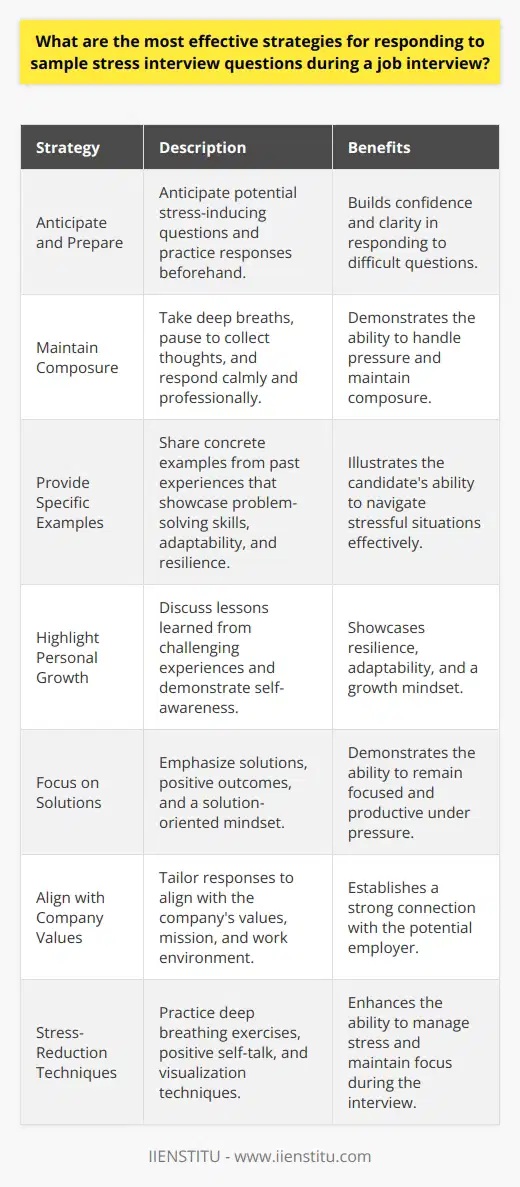
How do you effectively manage and cope with stressful situations?
Effectively managing and coping with stressful situations is crucial for maintaining mental and physical well-being. Several strategies can be employed to help individuals navigate challenging circumstances and reduce the negative impact of stress on their lives.
Identifying Stressors and Triggers
The first step in managing stress is to identify the sources of stress in your life. Take time to reflect on the situations, people, or events that consistently trigger feelings of anxiety or overwhelm. Once you recognize these stressors, you can develop targeted strategies to address them.
Developing a Support Network
Having a strong support system is essential when facing stressful situations. Reach out to friends, family members, or professionals who can offer emotional support and guidance. Talking about your concerns and feelings can help alleviate stress and provide a fresh perspective on the challenges you face.
Practicing Mindfulness and Relaxation Techniques
Mindfulness and relaxation techniques are powerful tools for managing stress. Engage in practices such as deep breathing, meditation, or yoga to calm your mind and body. These activities can help you stay grounded in the present moment and reduce the physical symptoms of stress, such as muscle tension and increased heart rate.
Prioritizing Self-Care
During stressful times, it's crucial to prioritize self-care activities that promote physical and emotional well-being. Ensure you get enough sleep, maintain a balanced diet, and engage in regular exercise. Make time for hobbies and activities that bring you joy and help you unwind, such as reading, listening to music, or spending time in nature.
Developing Effective Time Management Skills
Poor time management can contribute to stress and feelings of being overwhelmed. Develop a system to prioritize tasks and break larger projects into manageable steps. Use tools like calendars, to-do lists, and productivity apps to stay organized and focused. Learn to say no to non-essential commitments and delegate tasks when possible to reduce your workload.
Reframing Negative Thoughts
Stressful situations often lead to negative thought patterns that can exacerbate feelings of anxiety and helplessness. Practice reframing negative thoughts by challenging them with evidence and adopting a more balanced perspective. Focus on the aspects of the situation that you can control and let go of the things beyond your influence.
Seeking Professional Help
If stress becomes overwhelming and interferes with your daily functioning, don't hesitate to seek professional help. A mental health professional, such as a therapist or counselor, can provide you with additional coping strategies and support tailored to your specific needs. They can help you develop a personalized stress management plan and address any underlying mental health concerns.
Remember, managing stress is an ongoing process that requires patience and self-compassion. Be kind to yourself as you navigate challenging situations and celebrate the small victories along the way. By implementing these strategies and seeking support when needed, you can effectively cope with stress and maintain a sense of well-being in the face of adversity.
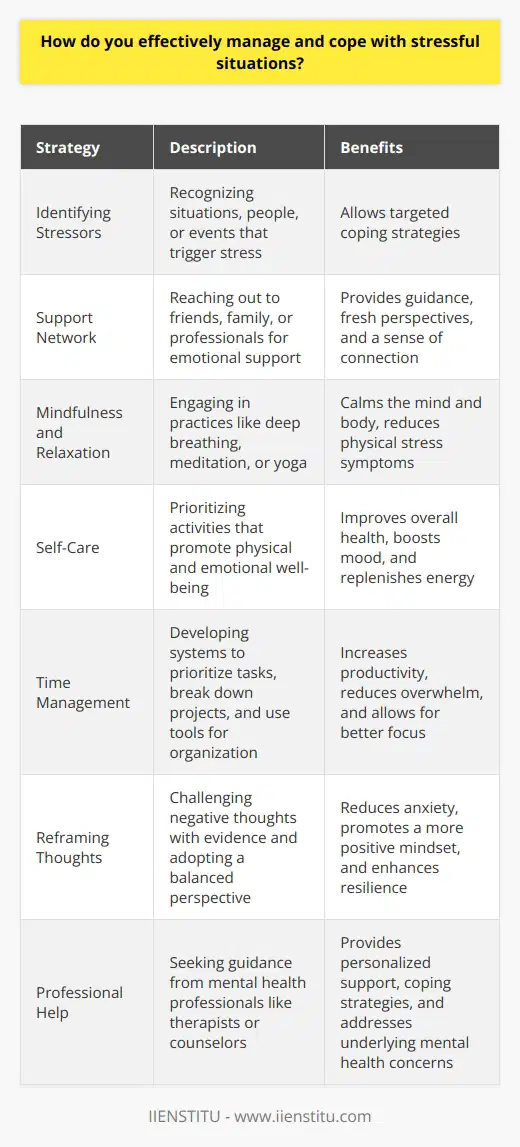
What strategies can be employed to reduce the negative impact of stress on one's mental and physical well-being?
Stress is a common issue that can have detrimental effects on both mental and physical well-being. Fortunately, there are several strategies that individuals can employ to reduce the negative impact of stress on their lives. These strategies include regular exercise, mindfulness practices, time management, and seeking social support.
Regular Exercise
Engaging in regular physical activity is one of the most effective ways to manage stress. Exercise releases endorphins, which are natural mood boosters that can help alleviate feelings of anxiety and depression. Additionally, regular exercise can improve sleep quality, boost self-esteem, and increase overall energy levels.
Aerobic Exercise
Aerobic exercises, such as running, cycling, or swimming, are particularly beneficial for stress reduction. These activities increase heart rate and promote deep breathing, which can help calm the mind and reduce tension in the body.
Strength Training
Strength training exercises, such as weightlifting or resistance band workouts, can also help reduce stress. These activities promote the release of endorphins and can help improve self-confidence and body image.
Mindfulness Practices
Mindfulness practices, such as meditation, deep breathing, and yoga, can be highly effective in reducing stress. These practices help individuals focus on the present moment and develop a greater sense of self-awareness, which can lead to improved emotional regulation and stress management.
Meditation
Meditation involves focusing the mind on a particular object, thought, or activity to achieve a mentally clear and emotionally calm state. Regular meditation practice can help reduce stress, anxiety, and negative emotions.
Deep Breathing
Deep breathing exercises can help calm the mind and body during stressful situations. By focusing on slow, deep breaths, individuals can activate the body's relaxation response and reduce feelings of tension and anxiety.
Yoga
Yoga combines physical postures, breathing techniques, and meditation to promote relaxation and stress relief. Regular yoga practice can help improve flexibility, strength, and mental clarity, while also reducing stress and anxiety.
Time Management
Effective time management is crucial for reducing stress and preventing overwhelm. By prioritizing tasks, setting realistic goals, and creating a balanced schedule, individuals can better manage their time and reduce feelings of stress and anxiety.
Prioritization
Prioritizing tasks based on importance and urgency can help individuals focus on what matters most and avoid unnecessary stress. By tackling high-priority tasks first, individuals can ensure that critical responsibilities are met and reduce overall stress levels.
Goal Setting
Setting realistic and achievable goals can help individuals stay motivated and focused, while also reducing stress. By breaking larger goals into smaller, manageable steps, individuals can make steady progress and avoid feeling overwhelmed.
Seeking Social Support
Building a strong support network of family, friends, and colleagues can be invaluable in managing stress. Talking to trusted individuals about stressors and challenges can help provide perspective, offer encouragement, and reduce feelings of isolation.
Connecting with Others
Regularly engaging in social activities and maintaining positive relationships can help reduce stress and promote overall well-being. Whether it's meeting a friend for coffee, joining a club or organization, or volunteering in the community, connecting with others can provide a sense of belonging and support.
Professional Support
In some cases, seeking professional support from a therapist or counselor may be necessary to effectively manage stress. These trained professionals can help individuals develop coping strategies, work through challenging emotions, and build resilience in the face of stress.
By incorporating these strategies into daily life, individuals can significantly reduce the negative impact of stress on their mental and physical well-being. It's important to remember that stress management is an ongoing process, and finding the strategies that work best for each individual may take time and experimentation. With patience, persistence, and a commitment to self-care, however, it is possible to effectively manage stress and lead a more balanced, fulfilling life.
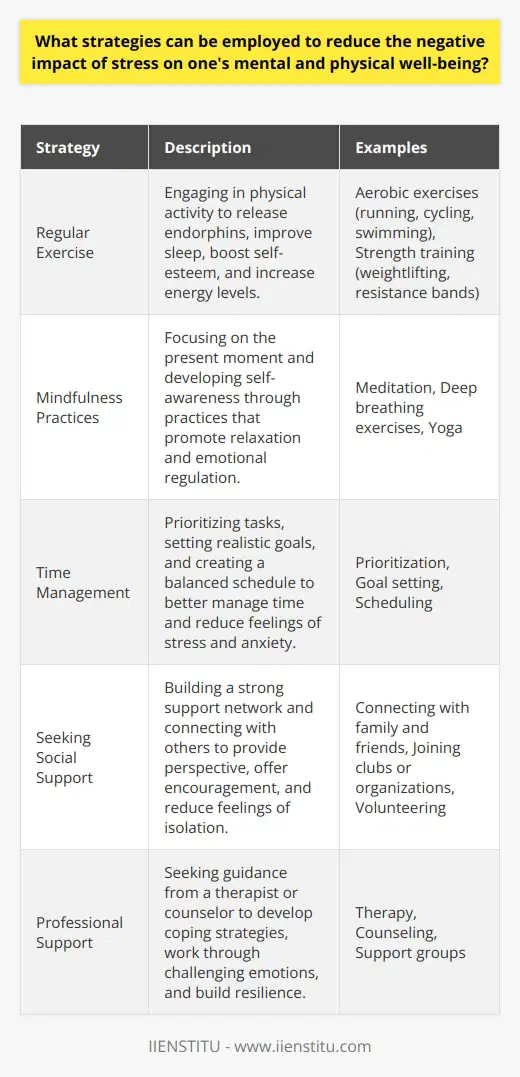
In what ways can individuals build resilience to better handle stressful circumstances?
Individuals can build resilience to better handle stressful circumstances through various strategies and techniques. Resilience is the ability to adapt and recover from adversity, trauma, or significant sources of stress. By developing resilience, individuals can maintain their mental health and well-being, even in the face of challenging situations.
Cultivating a Positive Mindset
One way to build resilience is by cultivating a positive mindset. This involves focusing on the things that are within your control and practicing gratitude for the good things in your life. It also means reframing negative thoughts and beliefs into more positive and realistic ones. By maintaining a positive outlook, individuals can better cope with stress and bounce back from setbacks.
Practicing Mindfulness
Mindfulness is another effective strategy for building resilience. It involves being present in the moment and observing your thoughts and feelings without judgment. By practicing mindfulness regularly, individuals can develop a greater sense of self-awareness and emotional regulation. This can help them respond to stressful situations in a more balanced and effective way.
Building Strong Relationships
Having strong relationships with others is also essential for building resilience. Social support can provide a buffer against stress and help individuals cope with difficult situations. It's important to cultivate relationships with family, friends, and colleagues who can offer emotional support and practical assistance when needed. Joining a support group or seeking professional help can also be beneficial.
Engaging in Self-Care
Self-care is another crucial aspect of building resilience. This involves taking care of your physical, emotional, and mental health through activities such as exercise, healthy eating, and getting enough sleep. It also means setting boundaries and saying no to things that drain your energy or cause unnecessary stress. By prioritizing self-care, individuals can maintain their well-being and be better equipped to handle challenges.
Developing Problem-Solving Skills
Developing problem-solving skills can also help individuals build resilience. This involves breaking down problems into smaller, manageable steps and brainstorming potential solutions. It also means being proactive and taking action to address issues before they become overwhelming. By developing a sense of mastery and control over their lives, individuals can feel more confident in their ability to handle stressful situations.
Practicing Flexibility and Adaptability
Finally, practicing flexibility and adaptability can help individuals build resilience. This means being open to change and willing to adjust your plans or expectations when necessary. It also involves learning from past experiences and using that knowledge to navigate future challenges. By developing a sense of flexibility and adaptability, individuals can better cope with the unpredictable nature of life.
In conclusion, building resilience is a critical skill for navigating the challenges and stresses of daily life. By cultivating a positive mindset, practicing mindfulness, building strong relationships, engaging in self-care, developing problem-solving skills, and practicing flexibility and adaptability, individuals can develop the inner strength and resources needed to handle stressful circumstances with greater ease and effectiveness.
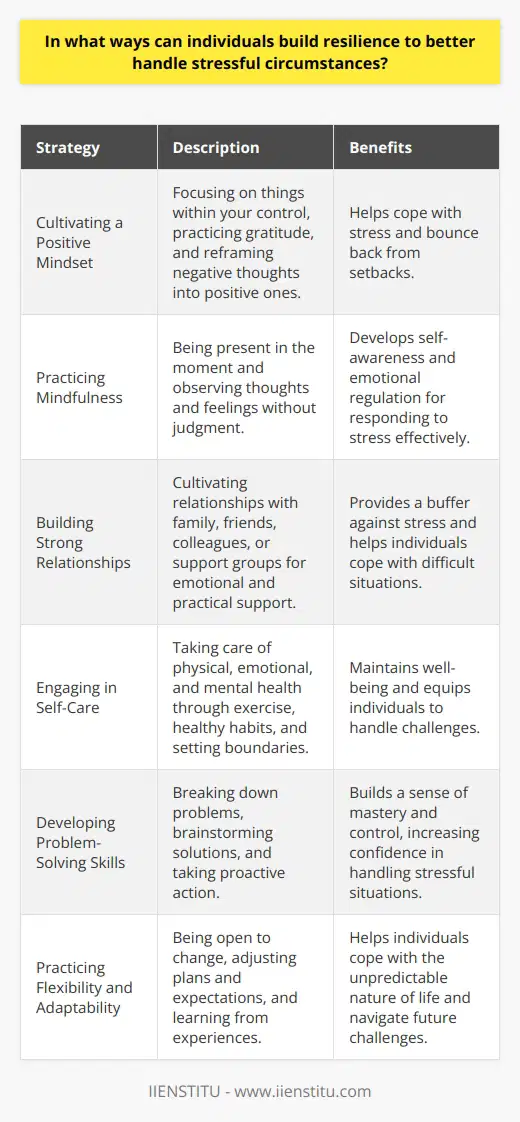
How do you typically handle pressure and stress in the workplace?
Handling pressure and stress in the workplace is a crucial skill for maintaining productivity and well-being. Effective stress management strategies can help individuals cope with challenging situations and prevent burnout. This article explores various techniques for dealing with pressure and stress in professional settings.
Identifying Stressors
The first step in managing stress is to identify the sources of pressure in the workplace. Common stressors include heavy workloads, tight deadlines, conflicts with colleagues, and lack of work-life balance. By recognizing these triggers, individuals can develop targeted strategies to address them.
Time Management and Prioritization
Effective time management is essential for reducing stress in the workplace. Prioritizing tasks based on importance and urgency helps individuals focus on critical responsibilities and avoid feeling overwhelmed. Breaking large projects into smaller, manageable tasks can also make them less daunting.
Creating a Daily Schedule
Establishing a daily schedule can help individuals allocate their time efficiently and stay organized. By planning out tasks and activities, individuals can ensure that they have sufficient time for work, breaks, and personal responsibilities.
Delegating and Seeking Support
Delegating tasks to colleagues or seeking support from supervisors can help alleviate pressure when workloads become overwhelming. Collaborating with team members and sharing responsibilities can distribute the burden and foster a supportive work environment.
Stress-Reduction Techniques
Incorporating stress-reduction techniques into daily routines can help individuals manage pressure more effectively. These techniques can include deep breathing exercises, meditation, or engaging in physical activity. Taking short breaks throughout the day to relax and recharge can also help reduce stress levels.
Mindfulness Practices
Mindfulness practices, such as meditation or yoga, can help individuals stay present and focused, reducing stress and anxiety. These practices can be done in short sessions throughout the day, even at one's desk.
Physical Exercise and Relaxation
Regular physical exercise is a powerful stress-reliever. Engaging in activities like walking, jogging, or cycling can help clear the mind and release endorphins, promoting a sense of well-being. Relaxation techniques, such as progressive muscle relaxation or deep breathing, can also help reduce tension.
Maintaining Work-Life Balance
Achieving a healthy work-life balance is crucial for managing stress in the workplace. Setting boundaries between work and personal life, such as avoiding checking work emails during off-hours, can help individuals disconnect and recharge. Engaging in hobbies, spending time with loved ones, and taking vacations can also promote a sense of balance and reduce overall stress levels.
Seeking Professional Support
When stress becomes overwhelming or persistent, seeking professional support can be beneficial. Many workplaces offer employee assistance programs (EAPs) that provide counseling services for work-related stress and personal issues. Talking to a therapist or counselor can help individuals develop coping strategies and gain a fresh perspective on challenging situations.
In conclusion, handling pressure and stress in the workplace requires a combination of self-awareness, effective time management, stress-reduction techniques, and a commitment to maintaining work-life balance. By implementing these strategies and seeking support when needed, individuals can navigate the challenges of the workplace with greater resilience and well-being.

What strategies have you found effective in managing tight deadlines and high-pressure situations at work?
Effective strategies for managing tight deadlines and high-pressure situations at work involve a combination of planning, prioritization, and stress management techniques. One crucial aspect of handling such scenarios is to break down the tasks into smaller, manageable components and create a clear timeline for completion. This approach allows for better focus and reduces the overall stress associated with the project.
Prioritization and Time Management
Prioritizing tasks based on their urgency and importance is essential in meeting tight deadlines. The Eisenhower Matrix, which categorizes tasks into four quadrants (urgent and important, important but not urgent, urgent but not important, and neither urgent nor important), can be a helpful tool in this process. By focusing on the most critical tasks first and delegating or eliminating less important ones, you can optimize your time and resources.
Effective time management is another key component of handling high-pressure situations. Techniques such as the Pomodoro Technique, which involves working in focused 25-minute intervals followed by short breaks, can help maintain productivity and prevent burnout. Additionally, minimizing distractions, such as turning off notifications on your phone or closing unnecessary browser tabs, can significantly improve focus and efficiency.
Communication and Collaboration
Clear communication is crucial when working under tight deadlines. Regularly updating your team members and stakeholders on progress, potential obstacles, and any changes in the timeline helps maintain transparency and ensures everyone is on the same page. Collaboration tools like project management software, instant messaging platforms, and video conferencing can facilitate efficient communication and coordination among team members.
Delegating Tasks and Seeking Support
Delegating tasks to team members with the appropriate skills and expertise can help distribute the workload and alleviate pressure during high-stress situations. It is essential to provide clear instructions and expectations to ensure that delegated tasks are completed efficiently and effectively. Additionally, seeking support from colleagues, supervisors, or mentors can provide valuable guidance and help troubleshoot any challenges that arise.
Stress Management and Self-Care
Managing stress is vital to maintaining productivity and well-being during high-pressure situations. Practicing relaxation techniques, such as deep breathing exercises or meditation, can help reduce anxiety and improve focus. Regular exercise, a balanced diet, and sufficient sleep are also essential for managing stress and maintaining overall health.
Maintaining a Positive Mindset
Cultivating a positive mindset can significantly impact your ability to handle high-pressure situations. Reframing challenges as opportunities for growth and learning can help maintain motivation and reduce stress. Celebrating small victories and acknowledging progress can also boost morale and keep you and your team motivated throughout the project.
Continuous Learning and Improvement
Regularly reflecting on your experiences and seeking feedback from colleagues and supervisors can help identify areas for improvement in managing tight deadlines and high-pressure situations. Attending workshops, reading relevant books or articles, and engaging in professional development opportunities can provide valuable insights and strategies for enhancing your skills in this area.
By implementing these strategies and continuously refining your approach, you can effectively manage tight deadlines and high-pressure situations at work, leading to improved performance, reduced stress, and greater overall success in your professional endeavors.
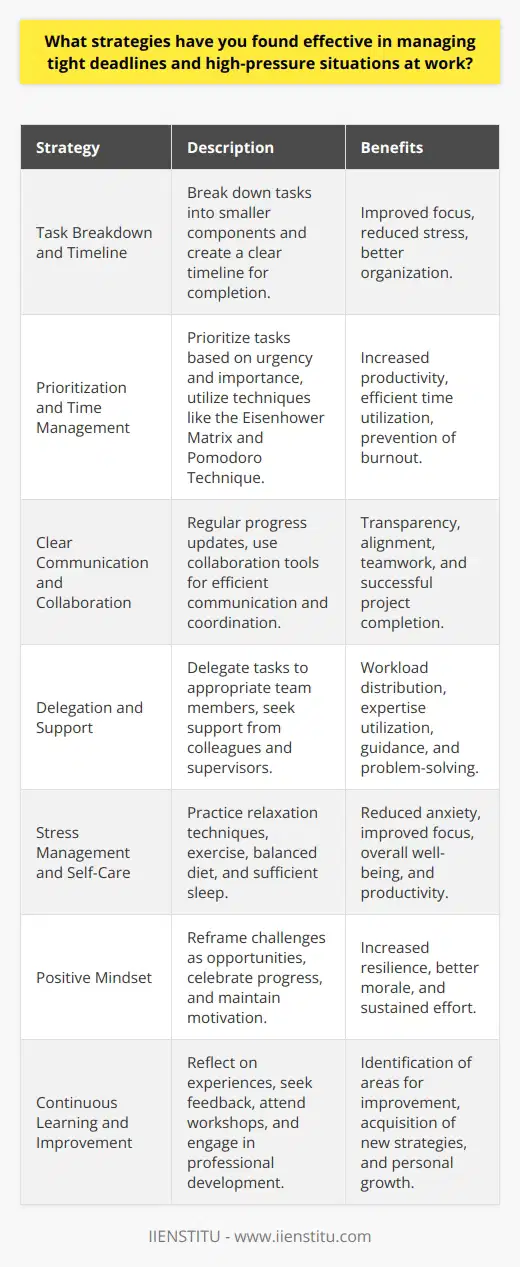
Can you give an example of a time when you successfully handled a challenging and pressured situation in your previous job?
In my previous role as a project manager, I successfully handled a challenging and pressured situation. Our team was tasked with delivering a complex software solution within a tight deadline. The client was demanding, and the stakes were high.
Assessing the Situation
I quickly assessed the situation and identified the key challenges we faced. These included limited resources, technical complexities, and a short timeline. I knew that to succeed, we needed a clear plan and effective communication.
Developing a Strategy
I developed a comprehensive strategy to address the challenges head-on. This involved breaking down the project into manageable tasks and assigning clear responsibilities to each team member. I also established regular check-ins to monitor progress and identify any potential roadblocks.
Communicating with Stakeholders
Effective communication was critical to the success of the project. I kept all stakeholders, including the client and upper management, informed of our progress. I also actively listened to their concerns and addressed them promptly.
Motivating the Team
I knew that keeping the team motivated was essential to handling the pressure. I regularly acknowledged their hard work and celebrated their successes. I also provided them with the resources and support they needed to succeed.
Overcoming Obstacles
Despite our best efforts, we encountered several obstacles along the way. Technical issues and unexpected changes in requirements threatened to derail the project. However, I remained calm under pressure and worked with the team to find creative solutions.
Adapting to Change
One of the keys to successfully handling the situation was being adaptable. When faced with unexpected changes, I quickly adjusted our plan and communicated the changes to the team. This helped us stay on track and meet our deadlines.
Delivering Results
Through hard work, effective communication, and a focus on results, we successfully delivered the software solution on time and to the client's satisfaction. The project was a success, and I received positive feedback from both the client and my superiors.
Learning from the Experience
Looking back, I learned several valuable lessons from this experience. I learned the importance of staying calm under pressure and being adaptable in the face of challenges. I also learned the value of effective communication and collaboration in achieving success.
Applying the Lessons Learned
Since then, I have applied these lessons to other challenging situations in my career. I have become more confident in my ability to handle pressure and deliver results. I have also become a better leader, able to motivate and support my team through difficult times.
In conclusion, successfully handling a challenging and pressured situation requires a combination of skills and strategies. By assessing the situation, developing a clear plan, communicating effectively, and staying adaptable, I was able to overcome obstacles and deliver results. This experience has made me a stronger and more confident professional, ready to tackle any challenge that comes my way.
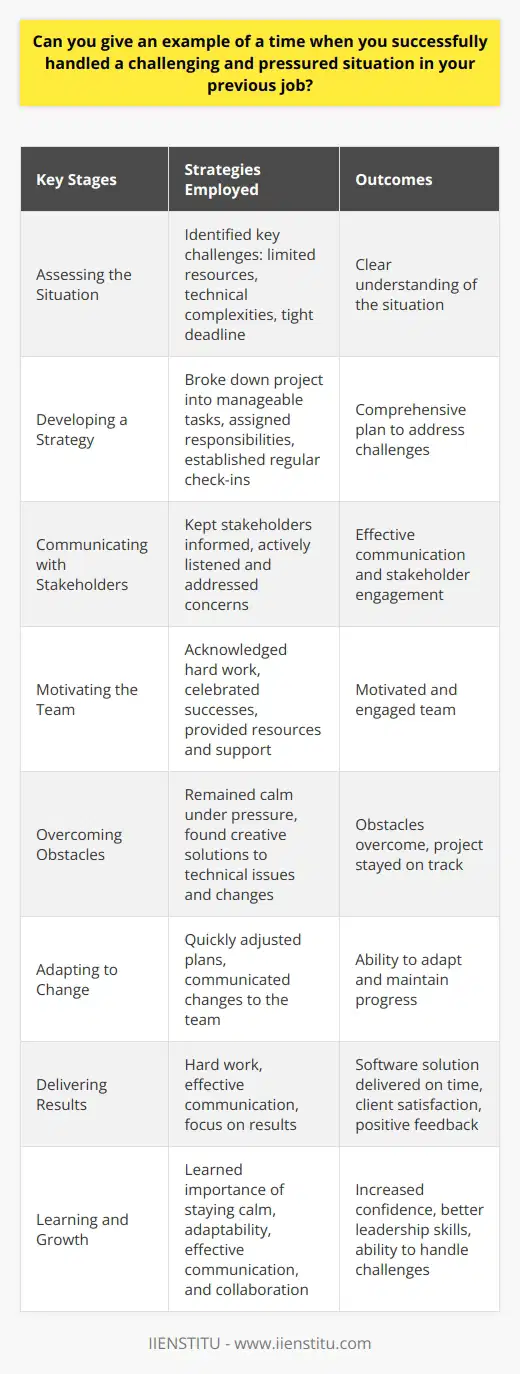
How do you typically respond when faced with a stressful situation at work or in your personal life?
When faced with a stressful situation, individuals tend to respond in various ways depending on their personality and coping mechanisms. Some people may approach the problem head-on, while others may try to avoid or escape the situation. Regardless of the approach, it is essential to recognize the signs of stress and develop healthy coping strategies to manage the situation effectively.
Identifying Stressors
The first step in responding to a stressful situation is to identify the source of the stress. This could be a demanding work project, a personal conflict, or a financial issue. Once the stressor is identified, it becomes easier to assess the situation and determine the best course of action.
Assessing the Situation
After identifying the stressor, it is crucial to assess the situation objectively. This involves evaluating the severity of the problem, the potential consequences, and the resources available to address the issue. By assessing the situation thoroughly, individuals can make informed decisions and develop a plan of action.
Developing a Plan
Based on the assessment, individuals can develop a plan to tackle the stressful situation. This plan should include specific steps to address the problem, a timeline for implementation, and a support system to help manage the stress. Having a well-defined plan can provide a sense of control and reduce feelings of overwhelm.
Implementing Coping Strategies
In addition to developing a plan, it is essential to implement healthy coping strategies to manage stress. These strategies may include:
Exercise and Physical Activity
Engaging in regular exercise and physical activity can help reduce stress levels by releasing endorphins and improving overall well-being. This could include going for a walk, practicing yoga, or participating in a favorite sport.
Relaxation Techniques
Relaxation techniques such as deep breathing, meditation, or progressive muscle relaxation can help calm the mind and body during stressful situations. These techniques can be practiced regularly to build resilience and improve stress management skills.
Social Support
Seeking support from friends, family, or a professional can provide a valuable outlet for expressing feelings and gaining perspective on the situation. Talking to someone can help reduce feelings of isolation and provide a sense of connection during difficult times.
Evaluating and Adjusting
As individuals implement their plan and coping strategies, it is important to regularly evaluate the effectiveness of their approach. If the stress persists or the situation does not improve, it may be necessary to adjust the plan or seek additional support. Continuously monitoring and adapting to the situation can help ensure a successful resolution.
Conclusion
Responding to stressful situations requires a proactive approach that involves identifying stressors, assessing the situation, developing a plan, implementing coping strategies, and evaluating progress. By utilizing these strategies and seeking support when needed, individuals can effectively manage stress and maintain their well-being in both their personal and professional lives.
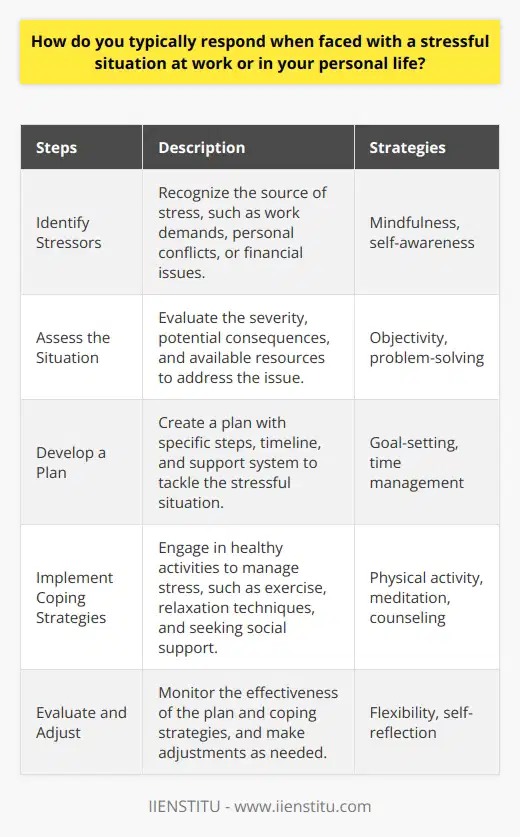
Can you provide an example of a particularly challenging and stressful situation you encountered, and what steps did you take to manage and overcome it?
One particularly challenging and stressful situation I encountered was during my final year of university. I was juggling multiple deadlines for assignments and exams while also working part-time to support myself financially. The pressure to perform well academically and maintain my job responsibilities was overwhelming, and I found myself struggling to cope with the demands on my time and energy.
Prioritizing Tasks
To manage the situation, I first took a step back and prioritized my tasks. I created a detailed schedule that allocated specific time slots for studying, working, and self-care activities. By breaking down my responsibilities into manageable chunks, I was able to focus on one task at a time and avoid feeling overwhelmed by the bigger picture.
Seeking Support
I also reached out to my support network, including friends, family, and university resources. I talked to my professors about my challenges and asked for extensions on assignments when necessary. I also utilized the university's counseling services to help me develop stress management techniques and maintain a healthy perspective.
Practicing Self-Care
In addition to seeking support, I made sure to prioritize self-care activities. I set aside time each day for exercise, relaxation, and hobbies that brought me joy. These activities helped me maintain a sense of balance and prevented burnout.
Staying Organized
To stay on top of my responsibilities, I used a variety of organizational tools. I created to-do lists, used a calendar app to keep track of deadlines, and broke down larger projects into smaller, manageable tasks. By staying organized, I was able to avoid last-minute scrambling and reduce my overall stress levels.
Maintaining Perspective
Finally, I tried to maintain a healthy perspective throughout the challenging period. I reminded myself that the stress was temporary and that I had the skills and resources to overcome it. I celebrated small victories along the way and focused on the progress I was making rather than dwelling on the challenges.
Lessons Learned
Through this experience, I learned the importance of prioritization, seeking support, practicing self-care, staying organized, and maintaining a positive perspective. These skills have served me well in subsequent challenging situations, both in my personal and professional life. While stress and challenges are inevitable, I now feel better equipped to manage them effectively and maintain my well-being in the process.
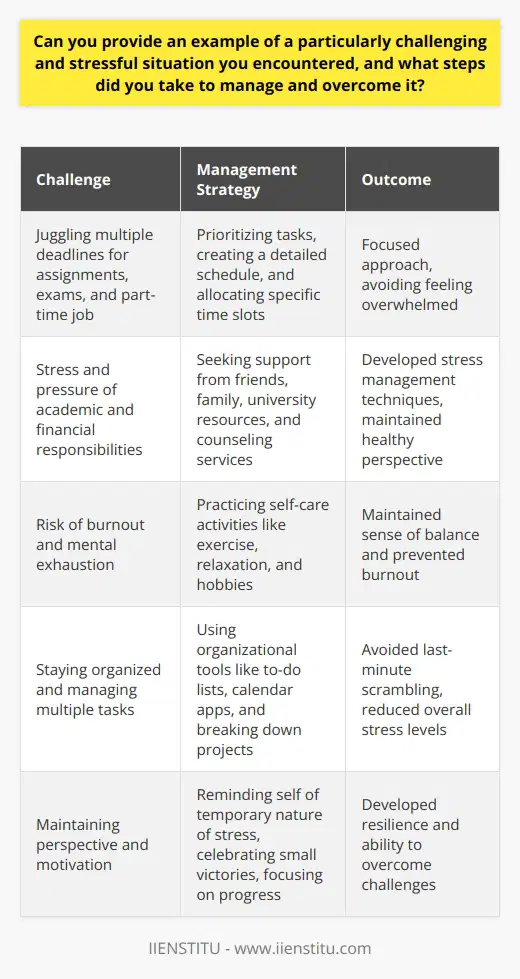
In what ways do you believe your approach to handling stressful situations has evolved or improved over time, and what have you learned from your experiences?
Throughout my life, I have encountered numerous stressful situations that have tested my resilience and adaptability. Over time, I have learned to approach these challenges with a more positive and proactive mindset, which has significantly improved my ability to cope with stress. In the past, I often found myself overwhelmed by the magnitude of the problems I faced, leading to feelings of anxiety and helplessness. However, as I gained more experience and self-awareness, I began to recognize the importance of breaking down complex issues into smaller, more manageable components.
Developing a Problem-Solving Approach
One of the most significant changes in my approach to handling stressful situations has been the adoption of a systematic problem-solving strategy. Instead of allowing myself to become paralyzed by stress, I now take a step back and assess the situation objectively. By identifying the root causes of the problem and brainstorming potential solutions, I feel more empowered and in control. This approach has taught me that even the most daunting challenges can be overcome with careful planning and execution.
Prioritizing Self-Care
Another crucial aspect of my personal growth has been the realization that self-care is essential for managing stress effectively. In the past, I often neglected my own well-being in the face of adversity, believing that I had to push myself to the limit to succeed. However, I have since learned that taking care of my physical, mental, and emotional health is not a luxury, but a necessity. By prioritizing activities such as regular exercise, mindfulness practices, and quality sleep, I have become more resilient and better equipped to handle stressful situations.
Seeking Support and Perspective
Furthermore, I have come to appreciate the value of seeking support and perspective from others when faced with stressful circumstances. In the past, I often tried to shoulder the burden alone, believing that asking for help was a sign of weakness. However, through my experiences, I have learned that collaborating with others and seeking advice from trusted mentors can provide invaluable insights and help me navigate challenging situations more effectively. By cultivating a strong support network and being open to different viewpoints, I have been able to approach stressful situations with greater confidence and clarity.
Embracing Growth and Resilience
Ultimately, my approach to handling stressful situations has evolved to embrace the idea that challenges are opportunities for growth and learning. Instead of viewing stress as a negative force to be avoided at all costs, I now see it as a chance to develop new skills, build resilience, and expand my comfort zone. By reframing stressful experiences as stepping stones toward personal and professional development, I have been able to maintain a more positive outlook and approach difficult situations with a sense of purpose and determination.
In conclusion, my approach to handling stressful situations has undergone a significant transformation over time. By adopting a proactive problem-solving mindset, prioritizing self-care, seeking support and perspective, and embracing challenges as opportunities for growth, I have become better equipped to navigate the complexities of life with greater resilience and adaptability. Through my experiences, I have learned that while stress is an inevitable part of the human experience, it is our response to it that ultimately defines our success and well-being.
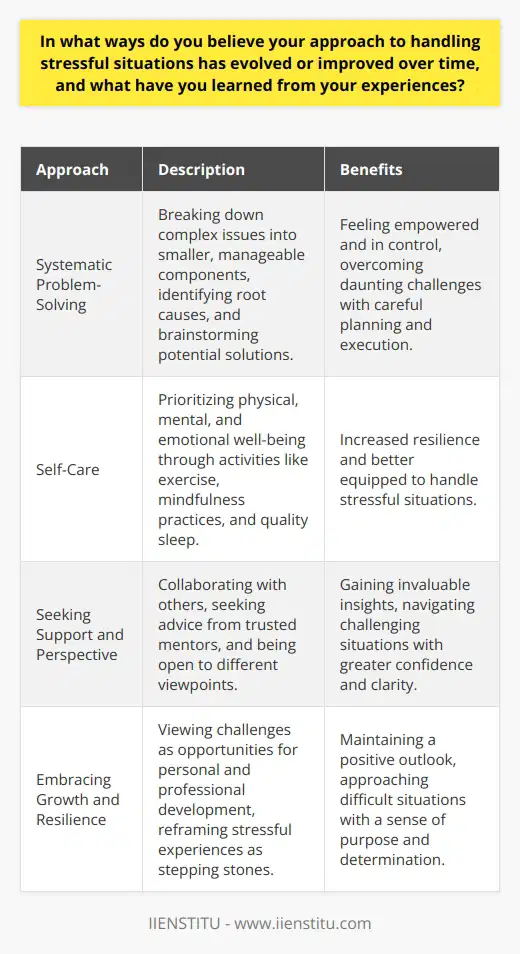
How do you effectively manage stress when dealing with challenging customers in customer service?
Effectively managing stress when dealing with challenging customers in customer service requires a multifaceted approach. It involves developing emotional intelligence, employing effective communication strategies, and practicing self-care. By cultivating these skills and techniques, customer service representatives can maintain composure and provide high-quality service even in the face of difficult interactions.
Develop Emotional Intelligence
Emotional intelligence is crucial for managing stress in customer service. It enables you to recognize and regulate your emotions. When faced with a challenging customer, take a moment to acknowledge your feelings without letting them dictate your response. By maintaining self-awareness and self-control, you can approach the situation with a clear mind and make rational decisions.
Practice Empathy
Empathy is a key component of emotional intelligence. Put yourself in the customer's shoes and try to understand their perspective. Recognize that their frustration or anger may stem from factors beyond your control. By demonstrating empathy, you show the customer that you value their concerns and are committed to finding a solution.
Employ Effective Communication Strategies
Effective communication is essential for managing stress and resolving customer issues. Listen actively to the customer's concerns without interrupting. Use a calm and professional tone, even if the customer is agitated. Acknowledge their feelings and express your willingness to help. By communicating clearly and respectfully, you can diffuse tense situations and find mutually beneficial solutions.
Use Positive Language
The language you use can greatly impact the customer's perception and your own stress levels. Focus on using positive language. Instead of saying "I can't do that," try "Let me see what I can do for you." Positive language shifts the focus from limitations to possibilities, reducing tension and promoting a more constructive dialogue.
Practice Self-Care
Taking care of yourself is essential for managing stress in customer service. Engage in stress-reducing activities outside of work, such as exercise, meditation, or hobbies. During your workday, take short breaks to recharge and reset. Practice deep breathing exercises to calm your mind and body when facing challenging situations. Remember to maintain a healthy work-life balance to prevent burnout.
Seek Support
Don't hesitate to seek support when needed. Reach out to your supervisor or colleagues for guidance or assistance. If your company offers an employee assistance program, take advantage of the resources available. Sharing your experiences and learning from others can provide valuable insights and coping strategies.
Continuously Learn and Adapt
Managing stress in customer service is an ongoing process. Continuously learn from your experiences and adapt your approach as needed. Attend training sessions or workshops to enhance your communication and problem-solving skills. Stay updated on your company's policies and procedures to handle challenging situations effectively. By continuously learning and adapting, you can build resilience and confidence in your ability to manage stress.
Remember, managing stress in customer service is not about eliminating stress entirely but rather developing the skills to navigate challenging situations effectively. By cultivating emotional intelligence, employing effective communication strategies, practicing self-care, seeking support, and continuously learning, you can maintain composure, provide excellent service, and protect your well-being in the face of challenging customers.
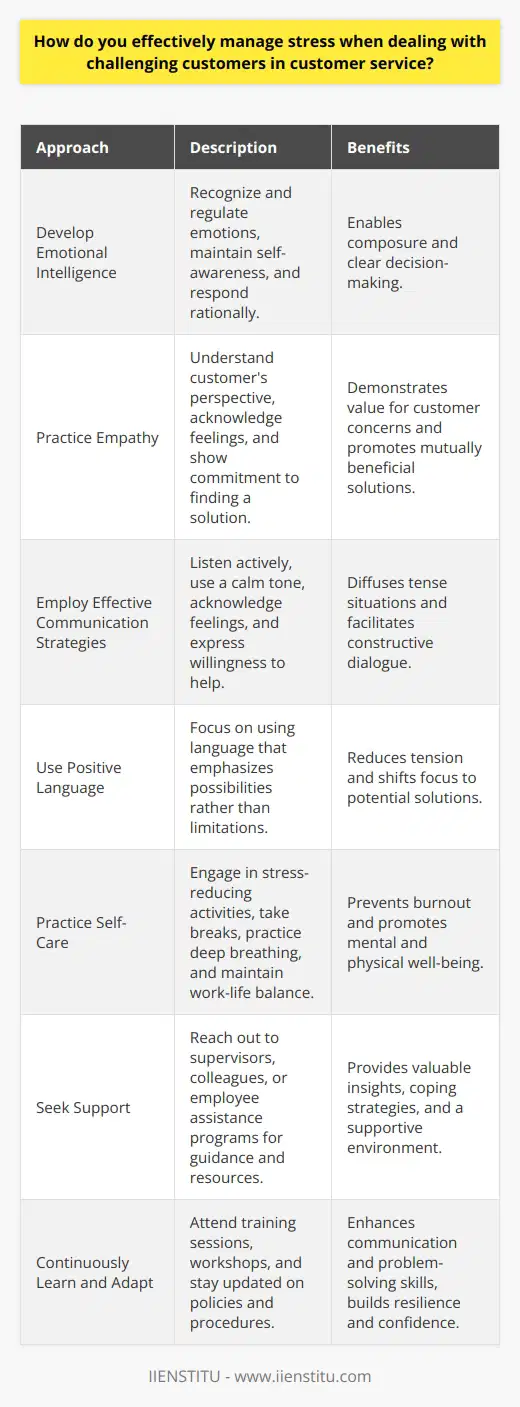
What strategies can be employed to maintain composure and professionalism during stressful customer interactions?
Maintaining composure and professionalism during stressful customer interactions is crucial for providing excellent customer service. Several strategies can be employed to ensure that customer service representatives remain calm and effective, even in challenging situations.
Active Listening and Empathy
One of the most important strategies is to practice active listening and demonstrate empathy. Representatives should focus on understanding the customer's concerns and acknowledging their feelings. By validating the customer's experience, representatives can build rapport and trust, which can help de-escalate tense situations.
Staying Calm and Positive
Another key strategy is to maintain a calm and positive demeanor. Representatives should speak in a friendly tone and avoid becoming defensive or argumentative. They should take deep breaths and focus on finding solutions rather than dwelling on the problem. By remaining composed, representatives can help diffuse the customer's frustration and guide the conversation towards a resolution.
Clear Communication and Setting Expectations
Clear communication is essential for managing stressful customer interactions. Representatives should explain the steps they are taking to resolve the issue and set realistic expectations for the customer. They should avoid using jargon or technical terms that may confuse the customer and instead use simple, easy-to-understand language.
Offering Solutions and Alternatives
When dealing with a difficult customer, representatives should focus on offering solutions and alternatives. They should explore different options and find ways to meet the customer's needs, even if it means going above and beyond their usual responsibilities. By demonstrating a willingness to help and providing practical solutions, representatives can turn a negative interaction into a positive one.
Seeking Support and Guidance
Finally, representatives should not hesitate to seek support and guidance from their supervisors or colleagues when needed. If a situation becomes too challenging to handle alone, representatives should escalate the issue to a higher level of authority. They should also take advantage of any training or resources provided by their organization to improve their skills in handling difficult customers.
Conclusion
By employing these strategies, customer service representatives can maintain composure and professionalism during stressful customer interactions. Active listening, empathy, clear communication, and a focus on solutions can help representatives navigate challenging situations and provide excellent customer service. With the right approach and support, representatives can turn even the most difficult interactions into opportunities to build customer loyalty and satisfaction.
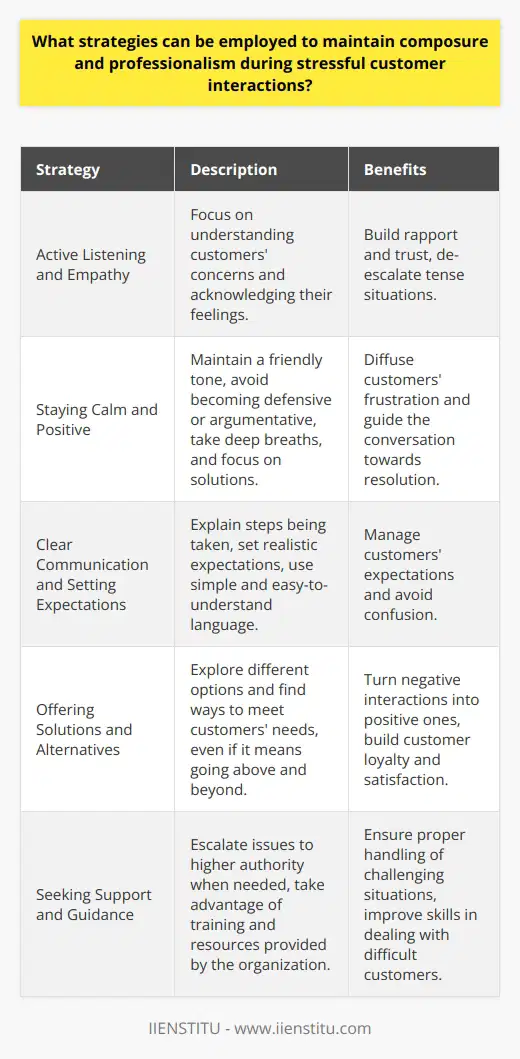
In what ways can customer service representatives cope with stress and prevent burnout while providing excellent service?
Customer service representatives face significant challenges in managing stress and preventing burnout while delivering exceptional service. To cope with these pressures, representatives can employ various strategies that promote personal well-being and enhance their ability to serve customers effectively. One crucial approach is to prioritize self-care, which includes maintaining a healthy work-life balance, engaging in regular exercise, and practicing relaxation techniques such as deep breathing or meditation. By taking care of their physical and mental health, representatives can build resilience and reduce the impact of stress on their performance.
Develop Emotional Intelligence
Another key strategy for managing stress is to develop strong emotional intelligence skills. Representatives who can recognize and regulate their own emotions are better equipped to handle challenging customer interactions with composure and empathy. Training programs that focus on emotional intelligence can help representatives build these essential skills, enabling them to communicate effectively, de-escalate tense situations, and maintain a positive attitude even in the face of adversity.
Seek Support from Colleagues and Supervisors
Building a supportive workplace environment is also critical for preventing burnout among customer service representatives. Encouraging open communication and collaboration among team members can foster a sense of camaraderie and shared purpose, reducing feelings of isolation and stress. Representatives should feel comfortable seeking guidance and support from their supervisors when facing difficult situations or experiencing burnout symptoms. Managers can play a vital role in promoting a healthy work culture by regularly checking in with their team members, offering feedback and recognition, and providing opportunities for professional development.
Utilize Technology and Resources
Leveraging technology and other resources can also help customer service representatives manage stress and deliver excellent service. Automated tools such as chatbots or knowledge bases can handle routine inquiries, allowing representatives to focus on more complex issues that require human intervention. Additionally, providing representatives with access to comprehensive product information, troubleshooting guides, and customer history can streamline the problem-solving process and reduce the mental strain of searching for solutions.
Embrace Continuous Learning and Improvement
Finally, encouraging a culture of continuous learning and improvement can help customer service representatives stay engaged and motivated in their roles. Regularly updating training materials and providing opportunities for skill development can keep representatives challenged and invested in their personal and professional growth. Soliciting feedback from customers and analyzing performance metrics can also identify areas for improvement and help representatives refine their approaches to delivering exceptional service.
By implementing these strategies, customer service representatives can effectively cope with stress, prevent burnout, and maintain the energy and enthusiasm necessary to provide outstanding support to customers. Investing in the well-being and development of customer service teams ultimately benefits both the representatives and the organizations they serve, leading to increased job satisfaction, improved customer experiences, and long-term business success.
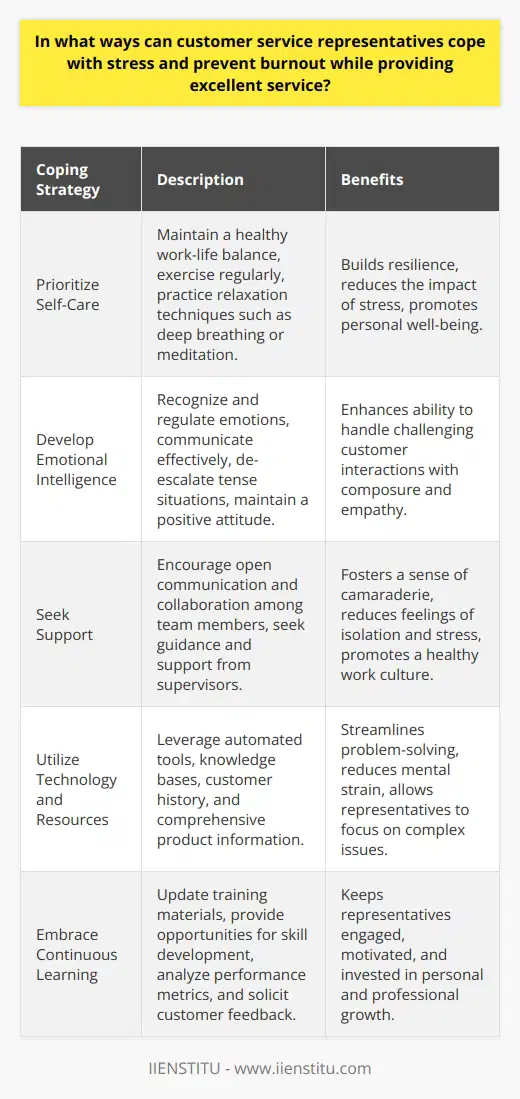
How do you typically cope with stress and pressure?
Coping with stress and pressure is a challenge that we all face in our daily lives. Whether it's due to work, school, or personal issues, finding effective ways to manage stress is crucial for maintaining our mental and physical well-being. In this blog post, I'll share some of the strategies that I typically use to cope with stress and pressure.
Prioritizing Self-Care
One of the most important things I've learned in managing stress is the significance of self-care. When I'm feeling overwhelmed, I make sure to carve out time for activities that help me relax and recharge. For me, this often involves practicing yoga, taking a warm bath, or reading a good book. I find that engaging in hobbies and interests outside of my work and responsibilities helps me maintain a sense of balance and perspective.
It's also essential to prioritize basic self-care habits like getting enough sleep, eating well, and staying hydrated. When I neglect these fundamental needs, I notice that my stress levels increase, and I become more susceptible to feeling overwhelmed. By taking care of my physical health, I'm better equipped to handle the pressures that come my way.
Practicing Mindfulness and Meditation
Another strategy I rely on for coping with stress is practicing mindfulness and meditation. I first discovered the benefits of mindfulness a few years ago when I was going through a particularly challenging time in my life. I found that by focusing on the present moment and observing my thoughts and emotions without judgment, I was able to gain a greater sense of clarity and calm.
I try to incorporate mindfulness into my daily routine, even if it's just for a few minutes each day. Sometimes I'll use guided meditation apps or videos to help me stay focused, while other times I simply take a few deep breaths and pay attention to my surroundings. I've found that the more I practice mindfulness, the easier it becomes to access that sense of inner peace, even in the midst of chaos.
Seeking Support from Others
One of the most valuable lessons I've learned in coping with stress is the importance of seeking support from others. When I'm feeling overwhelmed, it's tempting to isolate myself and try to handle everything on my own. However, I've found that reaching out to friends, family, or even a therapist can make a world of difference.
Talking through my concerns and feelings with someone I trust helps me gain new perspectives and ideas for managing my stress. It also reminds me that I'm not alone in my struggles and that it's okay to ask for help when I need it. Building a strong support system has been crucial in my journey to better stress management.
Embracing Imperfection
Finally, one of the most liberating strategies I've adopted for coping with stress is embracing imperfection. As someone who has always been a bit of a perfectionist, I've often found myself getting caught up in the idea that I need to do everything flawlessly. However, this mindset only adds to my stress levels and leaves me feeling constantly inadequate.
Learning to accept that perfection is an unrealistic and unattainable goal has been a game-changer for me. Instead of beating myself up over small mistakes or setbacks, I try to focus on the progress I'm making and the effort I'm putting in. Embracing imperfection has allowed me to approach challenges with a greater sense of resilience and adaptability.
In conclusion, coping with stress and pressure is an ongoing process that requires patience, self-compassion, and a willingness to try new strategies. By prioritizing self-care, practicing mindfulness, seeking support from others, and embracing imperfection, I've been able to navigate life's challenges with greater ease and resilience. Remember, there's no one-size-fits-all approach to stress management – the key is to find what works best for you and to be kind to yourself along the way.
What strategies have you found most effective in managing stress and pressure?
Throughout my life, I have encountered various stressful situations that have tested my resilience and coping mechanisms. Over time, I have discovered several effective strategies for managing stress and pressure, which I will share in this blog post.
Prioritizing Self-Care
One of the most crucial aspects of managing stress is prioritizing self-care. When we neglect our physical and mental well-being, we become more vulnerable to the negative effects of stress. I have found that incorporating regular exercise, healthy eating habits, and sufficient sleep into my daily routine helps me maintain a strong foundation for dealing with pressure.
Exercise, in particular, has been a game-changer for me. Whether it's going for a run, practicing yoga, or engaging in a team sport, physical activity allows me to release pent-up tension and clear my mind. The endorphins released during exercise also contribute to an improved mood and increased resilience.
Mindfulness and Meditation
Another powerful tool in my stress-management arsenal is mindfulness and meditation. In our fast-paced, constantly connected world, it's easy to get caught up in the chaos and forget to be present in the moment. By practicing mindfulness, I have learned to focus on the here and now, rather than dwelling on past regrets or future anxieties.
Meditation has been particularly helpful in reducing my stress levels. Even just a few minutes of deep breathing and quiet reflection can help me recenter myself and approach challenges with a clearer, more balanced perspective. There are many great apps and resources available for those new to meditation, such as Headspace and Calm.
Time Management and Boundaries
Effective time management is another key strategy for managing stress and pressure. When we feel overwhelmed by our to-do lists and commitments, it's easy to fall into a cycle of procrastination and anxiety. I have found that breaking tasks down into smaller, more manageable steps and setting realistic deadlines helps me stay on track and avoid becoming overwhelmed.
It's also important to set boundaries and learn to say no when necessary. As someone who has always been a people-pleaser, this was a difficult lesson for me to learn. However, I have come to realize that taking on too much can lead to burnout and decreased productivity in the long run. By prioritizing my own needs and limitations, I am better able to show up as my best self for the people and projects that matter most to me.
Seeking Support
Finally, I cannot stress enough the importance of seeking support when dealing with stress and pressure. Whether it's confiding in a trusted friend or family member, joining a support group, or seeking professional help through therapy or counseling, having a strong network of support can make all the difference.
I remember a particularly challenging period in my life when I was juggling a demanding job, family responsibilities, and personal health issues. I felt like I was drowning and didn't know where to turn. It was only when I reached out to a close friend and started seeing a therapist that I began to find my way back to solid ground. Asking for help is not a sign of weakness, but rather a sign of strength and self-awareness.
Conclusion
Managing stress and pressure is an ongoing process that requires patience, self-compassion, and a willingness to experiment with different strategies. What works for one person may not work for another, and that's okay. The key is to keep an open mind, be proactive about self-care, and remember that you don't have to go it alone.
By prioritizing my physical and mental health, practicing mindfulness and meditation, managing my time effectively, setting boundaries, and seeking support when needed, I have been able to navigate even the most stressful of situations with greater ease and resilience. I hope that by sharing my own experiences and insights, I can inspire others to find the stress-management strategies that work best for them.
In high-pressure situations, how do you maintain your composure and handle stress?
Maintaining composure and handling stress in high-pressure situations is a crucial skill for success in various aspects of life. It involves a combination of mental resilience, emotional regulation, and effective coping strategies. Here are some key approaches to staying calm and focused when the stakes are high.
Developing Mental Resilience
Mental resilience is the foundation of handling stress in challenging circumstances. It involves cultivating a strong mindset that allows you to bounce back from setbacks and maintain a positive outlook. To build mental resilience:
Practice self-awareness and identify your stress triggers
Reframe negative thoughts into more constructive ones
Embrace challenges as opportunities for growth and learning
Develop a growth mindset that embraces failure as a stepping stone to success
I remember a time when I was faced with a tight deadline at work. Instead of succumbing to the pressure, I took a step back and reframed the situation as a chance to showcase my abilities and deliver excellent results under pressure. This mental shift helped me stay focused and motivated throughout the project.
Emotional Regulation Techniques
Emotional regulation involves managing your emotional responses to stressful situations. When emotions run high, it's essential to have techniques in place to maintain composure. Some effective strategies include:
Deep breathing exercises to calm the mind and body
Progressive muscle relaxation to release physical tension
Mindfulness practices to stay present and grounded
Positive self-talk to boost confidence and resilience
I find that taking a few deep breaths and engaging in positive self-talk helps me regain my composure when I'm feeling overwhelmed. It's a simple yet powerful technique that I've used in various high-pressure situations, from job interviews to public speaking engagements.
Effective Coping Strategies
Having a toolkit of effective coping strategies is essential for managing stress in high-pressure situations. These strategies can help you maintain focus, make rational decisions, and perform at your best. Some helpful coping mechanisms include:
Breaking down complex tasks into manageable steps
Prioritizing and focusing on the most critical aspects of the situation
Seeking support and guidance from trusted colleagues or mentors
Taking short breaks to recharge and gain a fresh perspective
I remember a particularly stressful period during my college years when I had multiple exams and assignments due in a short timeframe. To cope with the pressure, I broke down my tasks into smaller, manageable chunks and prioritized them based on importance and urgency. I also reached out to my study group for support and took short breaks to recharge my mind. These strategies helped me stay organized and focused, ultimately leading to successful outcomes.
Conclusion
Handling stress and maintaining composure in high-pressure situations is a skill that can be developed and strengthened over time. By cultivating mental resilience, practicing emotional regulation techniques, and employing effective coping strategies, you can navigate challenging circumstances with greater ease and confidence. Remember, it's not about eliminating stress altogether but rather learning to manage it in a way that allows you to perform at your best when it matters most.
How do you typically cope with stress in high-pressure situations?
When faced with high-pressure situations, I employ several coping strategies to manage stress effectively. These techniques help me maintain focus, composure, and optimal performance during challenging times.
Prioritizing Self-Care
I prioritize self-care practices to build resilience and reduce stress. Regular exercise, such as jogging or yoga, helps me release tension and maintain physical well-being. Additionally, I ensure that I get sufficient sleep and maintain a balanced diet to support my mental and emotional health.
Taking short breaks throughout the day allows me to recharge and refocus. During these breaks, I engage in activities that bring me joy and relaxation, such as listening to music, reading a book, or practicing deep breathing exercises.
Breaking Down Tasks
When faced with a high-pressure situation, I break down the task or challenge into smaller, manageable parts. By creating a step-by-step plan, I can tackle each component systematically, reducing overwhelm and increasing my sense of control over the situation.
I set realistic goals and deadlines for each step, ensuring that I have a clear roadmap to follow. Celebrating small victories along the way helps maintain motivation and positive momentum.
Seeking Support
I recognize the importance of seeking support from others during high-pressure situations. Reaching out to trusted colleagues, friends, or family members allows me to share my concerns and gain valuable perspectives. Collaborating with others can also help distribute the workload and alleviate individual stress.
Additionally, I am not afraid to ask for help when needed. Seeking guidance from mentors or experts in the field can provide insights and strategies to navigate challenging circumstances effectively.
Practicing Mindfulness
Mindfulness techniques have been instrumental in managing stress during high-pressure situations. I take a few minutes each day to practice mindfulness meditation, focusing on my breath and being present in the moment. This practice helps me cultivate a sense of calm and clarity, even amidst chaos.
Throughout the day, I try to maintain mindfulness by paying attention to my thoughts and emotions without judgment. By acknowledging and accepting my stress, I can respond to it more effectively rather than becoming overwhelmed by it.
Maintaining Perspective
When faced with high-pressure situations, I strive to maintain a healthy perspective. I remind myself that challenges are temporary and that I have successfully overcome similar situations in the past. This mindset helps me build resilience and confidence in my ability to navigate difficult circumstances.
I also try to find opportunities for growth and learning within the challenges I face. By viewing high-pressure situations as chances to develop new skills and strengths, I can approach them with a more positive and proactive mindset.
Conclusion
Coping with stress in high-pressure situations requires a multi-faceted approach. By prioritizing self-care, breaking down tasks, seeking support, practicing mindfulness, and maintaining perspective, I am able to manage stress effectively and perform at my best. Remember, everyone's coping strategies may differ, so it's important to find what works best for you and to be patient with yourself as you navigate challenging times.
How do you prioritize tasks and manage your time when faced with stressful circumstances?
When faced with stressful circumstances, prioritizing tasks and managing time effectively becomes crucial for maintaining productivity and well-being. One effective strategy is to create a to-do list, which helps in organizing and visualizing the tasks at hand. By listing down all the tasks, you can gain clarity on what needs to be accomplished and in what order.
Prioritize based on urgency and importance
Once you have your to-do list, assess each task based on its urgency and importance. Urgent tasks are time-sensitive and require immediate attention, while important tasks contribute significantly to your goals and values. By categorizing tasks into these two dimensions, you can determine which tasks should be tackled first. Tasks that are both urgent and important should be given the highest priority, followed by important but not urgent tasks.
Break down larger tasks into smaller, manageable steps
When a task seems overwhelming, it can lead to procrastination and increased stress. To combat this, break down larger tasks into smaller, more manageable steps. By dividing a complex task into bite-sized pieces, you can make progress gradually and feel a sense of accomplishment along the way. This approach also helps in maintaining focus and motivation, as each completed step brings you closer to the overall goal.
Use time-blocking techniques
Time-blocking is a powerful technique for managing time effectively. It involves allocating specific time slots for different tasks or activities. By dedicating focused blocks of time to specific tasks, you can minimize distractions and improve productivity. For example, you can block an hour for responding to emails, followed by a two-hour block for working on a high-priority project. Time-blocking helps in creating structure and ensures that you allocate sufficient time for each task.
Take regular breaks and practice self-care
During stressful times, it's easy to neglect self-care and push yourself beyond your limits. However, taking regular breaks and prioritizing self-care is essential for maintaining productivity and preventing burnout. Schedule short breaks throughout your day to recharge and refocus. Use these breaks to engage in activities that promote relaxation and well-being, such as stretching, deep breathing, or taking a quick walk. Additionally, ensure that you allocate time for proper nutrition, exercise, and sufficient sleep, as these factors significantly impact your ability to handle stress and maintain optimal performance.
Remember, managing time and prioritizing tasks during stressful circumstances is a skill that can be developed with practice. By implementing these strategies consistently, you can enhance your ability to navigate challenging situations, reduce stress, and achieve your goals more effectively. Stay flexible and adaptable, as priorities may shift based on changing circumstances. Trust in your ability to handle the tasks at hand and celebrate your progress along the way.
In what ways do you maintain a positive attitude and stay focused on your goals during stressful periods?
Maintaining a positive attitude and staying focused on goals during stressful periods can be challenging. However, there are several effective strategies that I have found helpful in managing stress and keeping a positive outlook.
Practice Mindfulness and Meditation
One of the most powerful tools for reducing stress and maintaining a positive attitude is mindfulness. Taking a few minutes each day to sit quietly, focus on your breath, and observe your thoughts without judgment can help you feel more centered and calm. When I'm feeling particularly stressed, I like to do a guided meditation using an app like Headspace or Calm.
Meditation has been shown to reduce stress, improve emotional regulation, and increase overall well-being. It helps me gain perspective on my challenges and approach them with a more positive mindset.
Focus on Gratitude
Another effective strategy for maintaining a positive attitude is to focus on gratitude. When I'm feeling overwhelmed or discouraged, I take a few moments to think about the things I'm grateful for in my life. This could be anything from my supportive family and friends to the simple pleasures of a warm cup of coffee or a beautiful sunset.
Keeping a gratitude journal is a great way to make this practice a regular habit. Each day, write down three things you're grateful for, no matter how small. Over time, this helps train your brain to look for the positive, even in difficult situations.
Set Realistic Goals and Celebrate Progress
When it comes to staying focused on goals during stressful times, it's important to set realistic expectations. Break larger goals down into smaller, manageable steps and celebrate your progress along the way.
For example, if I'm working on a big project at work, I might set a goal to complete a certain section by the end of the week. When I achieve that milestone, I take a moment to acknowledge my progress and give myself a small reward, like taking a break to go for a walk or chat with a co-worker.
Practice Self-Care
Finally, practicing regular self-care is essential for maintaining a positive attitude and managing stress. This looks different for everyone, but some of my favorite self-care activities include exercise, spending time in nature, reading a good book, and connecting with loved ones.
When I'm feeling particularly stressed, I make sure to prioritize activities that help me feel recharged and refreshed. This might mean saying no to social invitations or work commitments in order to carve out time for myself.
Conclusion
Maintaining a positive attitude and staying focused on goals during stressful periods is an ongoing practice. By incorporating mindfulness, gratitude, realistic goal-setting, and self-care into your daily routine, you can build resilience and navigate challenges with greater ease. Remember to be kind to yourself and celebrate your progress along the way.
How do you cope with stress and pressure in your workplace?
Coping with stress and pressure in the workplace is a challenge that many professionals face daily. Developing effective strategies to manage these feelings is crucial for maintaining productivity, well-being, and job satisfaction. Here are some personal experiences and insights on how to navigate the demands of a high-pressure work environment.
Prioritize Self-Care
One of the most important lessons I've learned is to prioritize self-care. When work pressures mount, it's easy to neglect our physical and emotional needs. However, taking care of ourselves is essential for building resilience and preventing burnout.
I make sure to set aside time for activities that help me unwind and recharge. For me, that means going for a run after work, practicing yoga, or simply taking a relaxing bath. Find what works for you and make it a non-negotiable part of your routine.
Communicate Openly
Another key strategy is to communicate openly with your colleagues and supervisors. When you're feeling overwhelmed, don't hesitate to speak up and ask for support. I remember a particularly challenging project where I felt like I was drowning in tasks. I mustered up the courage to talk to my manager, and together we found ways to delegate some responsibilities and extend deadlines.
Remember, your team is there to support you, but they can only do so if they're aware of your struggles. By fostering a culture of open communication, you create a more collaborative and understanding work environment.
Practice Mindfulness
Mindfulness has been a game-changer for me in managing stress. When I feel tension rising, I take a few minutes to focus on my breath and bring my attention to the present moment. This simple practice helps me gain perspective and prevents stress from spiraling out of control.
You can incorporate mindfulness into your workday in small ways, such as taking mindful breaks, practicing deep breathing exercises, or even using a meditation app during your lunch break. By cultivating a sense of calm and presence, you'll be better equipped to handle the challenges that come your way.
Set Realistic Expectations
One of the biggest sources of stress in the workplace is unrealistic expectations. We often put immense pressure on ourselves to meet impossible deadlines or achieve perfection in every task. I've learned the hard way that this mindset is not only unsustainable but also counterproductive.
Instead, I now strive to set realistic goals and expectations for myself. I break down large projects into manageable chunks and celebrate small victories along the way. By focusing on progress rather than perfection, I alleviate some of the self-imposed pressure and maintain a healthier outlook on my work.
Find a Support System
Finally, having a strong support system is essential for coping with stress and pressure at work. Surround yourself with colleagues who uplift and encourage you. I'm grateful to have a few close co-workers whom I can turn to for advice, a listening ear, or a much-needed laugh during tough times.
Outside of work, make sure to nurture relationships with friends and family. Talking to loved ones about your struggles can provide a fresh perspective and help you feel less alone. Remember, you don't have to face the challenges of work stress on your own.
In conclusion, coping with stress and pressure in the workplace is an ongoing process that requires self-awareness, proactive strategies, and a supportive network. By prioritizing self-care, communicating openly, practicing mindfulness, setting realistic expectations, and leaning on your support system, you can navigate the demands of your job with greater resilience and well-being. Remember, your mental health is just as important as your professional success, so don't hesitate to take steps to care for yourself along the way.
What strategies do you employ to manage stress and pressure in your professional life?
As a professional, managing stress and pressure is crucial for maintaining productivity and well-being. Over the years, I have developed several strategies that help me cope with the demands of my job.
Prioritizing and Planning
One of the most effective ways to manage stress is by prioritizing tasks and planning my schedule. I start each day by creating a to-do list, focusing on the most important and urgent tasks first. This helps me feel in control and reduces the overwhelming feeling of having too much on my plate.
I also break down larger projects into smaller, manageable steps. By tackling them one at a time, I avoid getting stressed out by the complexity of the entire project. Setting realistic deadlines for myself and communicating them with my team also helps manage expectations and minimize last-minute rushes.
Practicing Mindfulness
Mindfulness has been a game-changer for me in terms of stress management. I take a few minutes each day to practice deep breathing exercises and meditation. This helps me clear my mind, reduce anxiety, and improve focus.
When I feel overwhelmed during the day, I take short breaks to practice mindfulness. Even a quick 5-minute walk outside or a few stretches at my desk can help me reset and recharge. I find that this not only reduces stress but also boosts my creativity and problem-solving skills.
Maintaining Work-Life Balance
I firmly believe in the importance of maintaining a healthy work-life balance. I make sure to set boundaries between my personal and professional life, avoiding checking emails or taking work calls outside of office hours unless absolutely necessary.
I also prioritize self-care activities like exercise, hobbies, and spending time with loved ones. Engaging in activities that bring me joy and relaxation helps me recharge and approach work with a fresh perspective.
Seeking Support
Finally, I have learned the importance of seeking support when needed. I regularly communicate with my colleagues and supervisors about my workload and any challenges I'm facing. Collaborating with others and delegating tasks when appropriate helps alleviate stress and prevents burnout.
I also have a trusted network of friends, family, and mentors who I can turn to for advice and support. Talking through my concerns and getting an outside perspective can be incredibly helpful in managing stress and finding solutions to problems.
Conclusion
Managing stress and pressure in a professional setting is an ongoing process that requires a combination of strategies. By prioritizing tasks, practicing mindfulness, maintaining work-life balance, and seeking support when needed, I have been able to effectively cope with the demands of my job and maintain a sense of well-being. While stress is inevitable in any career, developing a toolkit of stress management techniques has been crucial for my success and satisfaction in the workplace.
In what ways do you effectively handle stress and pressure while on the job?
Stress and pressure are an inevitable part of most jobs. Whether it's tight deadlines, demanding clients, or challenging projects, learning how to effectively handle stress is key to maintaining your wellbeing and performance at work. Over my career, I've developed a few go-to strategies that help me keep my cool under pressure.
Take a Step Back
When I'm feeling overwhelmed by stress at work, I find it helpful to take a brief step back. I'll go for a quick walk outside, do some stretches at my desk, or take a few minutes to practice deep breathing. Just having a moment to myself, away from the immediate pressures, allows me to clear my head and regain perspective. It's amazing how solutions often appear after a short break that weren't obvious when I was caught up in the stress of the moment.
Prioritize and Focus
Another way I manage stress is by ruthlessly prioritizing my workload and focusing on one thing at a time. When everything feels urgent, I take a hard look at my to-do list and identify the true priorities - the tasks that will have the biggest impact or the nearest deadlines. Then I give my full attention to knocking out those items first. I've learned multitasking only makes me feel more stressed. Focusing on completing one important task at a time is much more effective and rewarding.
Communicate and Delegate
Handling stress also means knowing when to ask for help or delegate. I used to think asking for help was a sign of weakness. But I've come to realize there is strength in being transparent about your capacity and bringing in reinforcements when needed. If I'm drowning in deadlines, I'll raise a flag to my manager or team to problem-solve together. We might re-assign tasks, call in additional resources, or reset expectations with stakeholders. The key is clear communication. Suffering in silence and trying to be a hero only leads to more stress.
Keep Things in Perspective
Finally, when the pressure is on, I find it crucial to maintain perspective. I ask myself - will this matter in a year? In 5 years? Keeping the bigger picture in mind stops me from spiraling over temporary setbacks or challenges. Mistakes happen, plans change, curveballs come out of nowhere. Realizing that stress is often short-lived helps me stay grounded through the ups and downs.
Find Your Pressure Release Valve
At the end of the day, I think effectively handling stress comes down to knowing yourself and what you need. We all have different ways of recharging and re-centering. For me, it's exercise, time in nature, and heart-to-hearts with family and friends. When stress from work starts seeping into my personal time, I know it's time to double down on prioritizing these restorative activities. Because the better I am at releasing stress off the clock, the better I'm able to show up and handle it at work.
What are some common questions asked during a stress interview, and how should one respond to them?
Stress interviews are designed to put candidates under pressure and assess their ability to handle challenging situations. Some common questions asked during stress interviews include:
1. "What would you do if you disagreed with your boss's decision?"
When responding to this question, emphasize your ability to communicate respectfully and find a mutually beneficial solution. For example, you could say, "I would schedule a private meeting with my boss to discuss my concerns and listen to their perspective. Together, we would explore alternative solutions that align with the company's goals."
Remember to:
Show respect for authority
Demonstrate problem-solving skills
Highlight your ability to find compromises
2. "Tell me about a time when you failed at something."
This question assesses your ability to learn from mistakes and maintain a positive attitude. When answering, choose a specific example and focus on the lessons you learned. You could say, "In my previous job, I missed an important deadline due to poor time management. From that experience, I learned to prioritize tasks, set realistic goals, and communicate proactively with my team."
Remember to:
Be honest about your failure
Emphasize the lessons learned
Show personal growth and development
3. "How would you handle a situation where a colleague was not pulling their weight?"
This question evaluates your leadership skills and ability to address sensitive issues. When responding, focus on finding a constructive solution that benefits the team. For instance, you could say, "I would first speak with my colleague privately to understand their challenges and offer support. If the issue persists, I would document specific examples and discuss the situation with my supervisor to develop an action plan."
Remember to:
Show empathy and understanding
Demonstrate a proactive approach
Emphasize the importance of teamwork
4. "What would you do if you were asked to perform a task you felt was unethical?"
This question assesses your integrity and ability to stand up for your values. When answering, emphasize your commitment to ethical behavior and your willingness to voice concerns. You could say, "I would express my concerns to my supervisor and explain why I believe the task is unethical. If the issue remains unresolved, I would escalate the matter to higher management or the company's ethics committee."
Remember to:
Show a strong moral compass
Demonstrate courage to speak up
Emphasize the importance of ethical behavior
Key Takeaways
When responding to stress interview questions, it's essential to remain calm, composed, and focused on finding solutions. Draw upon your personal experiences and values to provide authentic answers that showcase your ability to handle challenging situations with professionalism and integrity.
Remember, the interviewer is not only evaluating your responses but also observing how you react under pressure. By staying true to yourself and demonstrating resilience, you can navigate stress interviews with confidence and ease.
How can a candidate remain composed and confident when faced with challenging or unexpected questions in a stress interview?
When faced with challenging or unexpected questions in a stress interview, remaining composed and confident is crucial. I remember my first stress interview and how nervous I felt, but I learned some valuable strategies that helped me stay calm and focused.
Prepare thoroughly
One of the most important things you can do is to prepare thoroughly before the interview. Research the company, the position, and the industry. Anticipate potential questions and practice your responses. The more prepared you are, the more confident you'll feel.
I spent hours researching and practicing before my interview, and it made a huge difference. When tough questions came up, I had relevant examples and ideas ready to share.
Take a deep breath
When a challenging question catches you off guard, take a deep breath before responding. This helps you stay calm and gives you a moment to gather your thoughts. Don't rush into an answer - it's okay to take a few seconds to compose yourself.
In my stress interview, I was asked a question that completely stumped me. I took a deep breath, smiled, and said, "That's a great question. Let me think about that for a moment." That brief pause helped me stay poised and come up with a thoughtful response.
Stay positive
Maintain a positive attitude throughout the interview, even if the questions are tough. Don't get defensive or argumentative. Instead, focus on highlighting your strengths and experiences.
I remember feeling frustrated by some of the questions in my interview, but I tried to stay upbeat. I smiled, made eye contact, and shared examples of how I had overcome challenges in the past.
Be honest
If you don't know the answer to a question, it's okay to admit it. Don't try to bluff your way through - the interviewer will likely see right through it. Instead, be honest and try to provide a related example or experience.
In my case, I was asked about a software program I had never used. Instead of pretending to know about it, I said, "I'm not familiar with that specific program, but I have experience with similar tools. For example, I recently used XYZ software to complete a project and found it very intuitive."
Ask clarifying questions
If a question is unclear or you need more information, don't be afraid to ask for clarification. This shows that you're engaged and want to provide a relevant answer.
I remember being asked a vague question about my leadership style. Instead of guessing what the interviewer wanted, I asked, "Can you give me an example of a leadership situation you're curious about? I'd be happy to share how I would approach it." This helped me provide a more targeted and meaningful response.
Conclusion
Stress interviews can be intimidating, but with the right mindset and strategies, you can remain composed and confident. Prepare thoroughly, stay positive, be honest, and don't hesitate to ask clarifying questions. Remember, the interviewer wants to see how you handle pressure and think on your feet. By staying calm and focused, you'll be able to showcase your skills and experiences in the best possible light.
What strategies can be employed to effectively navigate a stress interview and demonstrate one's ability to handle pressure?
Navigating a stress interview requires a combination of mental preparation, self-awareness, and effective communication strategies. To demonstrate your ability to handle pressure, start by researching the company and the role beforehand. This will help you anticipate potential questions and scenarios that may arise during the interview.
Maintain a Positive Mindset
Before the interview, take time to mentally prepare yourself. Engage in activities that help you feel calm and centered, such as deep breathing exercises or visualization techniques. Remind yourself of your strengths and accomplishments, and approach the interview with a positive attitude.
During the interview, stay composed and avoid getting defensive or argumentative, even if the interviewer's questions seem confrontational. Remember, the goal is to assess your ability to handle stress, not to attack you personally.
Provide Specific Examples
When faced with challenging questions, draw upon your past experiences to provide concrete examples of how you have successfully handled pressure in the workplace. Talk about a time when you had to meet a tight deadline or resolve a conflict with a colleague. Explain the steps you took to manage the situation and the positive outcomes that resulted.
I once had to deliver a critical project presentation to a client with only 24 hours' notice. Despite the tight timeline, I stayed focused, delegated tasks to my team, and worked late into the night to ensure the presentation was polished and persuasive. The client was impressed with our work, and we secured a long-term contract as a result.
Communicate Clearly and Confidently
Throughout the interview, speak clearly and maintain eye contact with the interviewer. Use a calm and measured tone, even if you feel frustrated or anxious. Take a moment to gather your thoughts before responding to difficult questions, and don't be afraid to ask for clarification if needed.
Remember, it's okay to admit if you don't have an immediate answer to a question. You can say something like, "That's a great question. Let me take a moment to consider it." This shows that you are thoughtful and reflective, rather than impulsive or easily flustered.
Highlight Your Problem-Solving Skills
Stress interviews often involve hypothetical scenarios or brainteasers designed to test your problem-solving abilities. Approach these challenges with enthusiasm and creativity. Walk the interviewer through your thought process, even if you don't arrive at a perfect solution.
For example, if asked how many gas stations there are in the United States, you might say something like, "Well, let's break this down. There are approximately 330 million people in the U.S., and let's assume that on average, there's one gas station for every 5,000 people. That would give us around 66,000 gas stations nationwide. Of course, this is just a rough estimate, but it gives us a starting point to work from."
Conclude on a Positive Note
At the end of the interview, thank the interviewer for their time and reiterate your interest in the position. Express your appreciation for the opportunity to showcase your skills and experience, even under challenging circumstances.
Remember, a stress interview is not designed to make you feel bad about yourself. It's an opportunity to showcase your resilience, adaptability, and grace under pressure. By staying calm, confident, and focused on your strengths, you can navigate even the toughest interview questions and demonstrate your value as a candidate.
